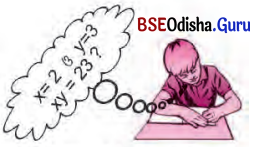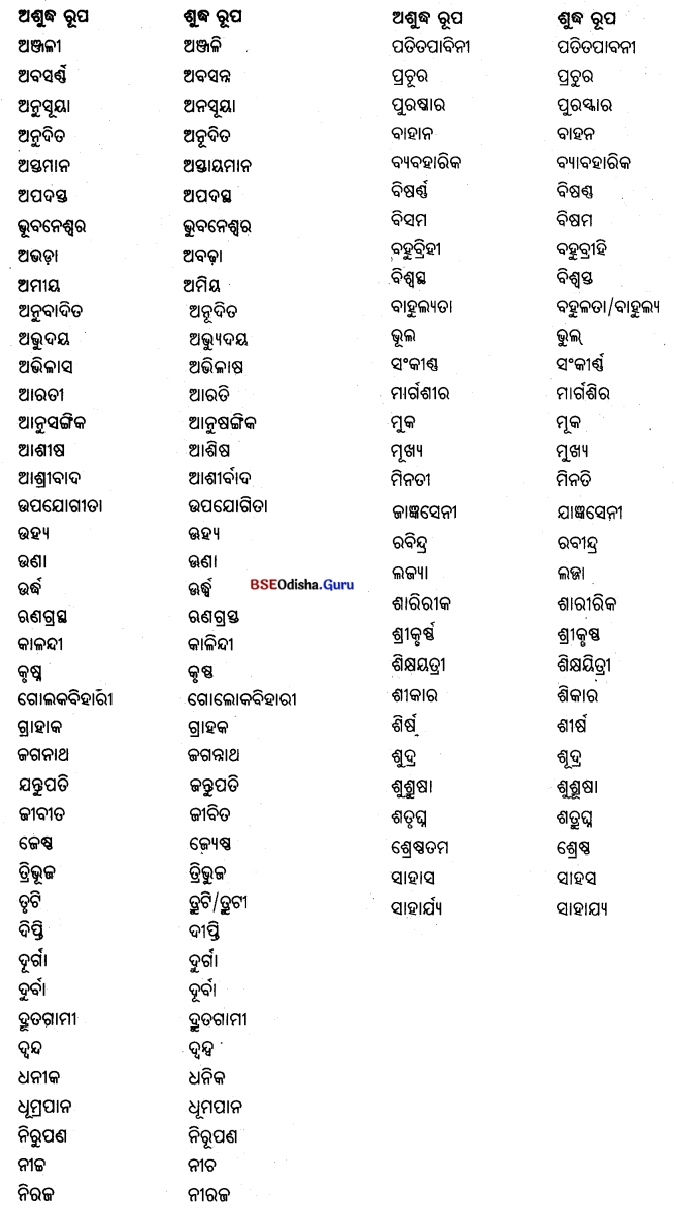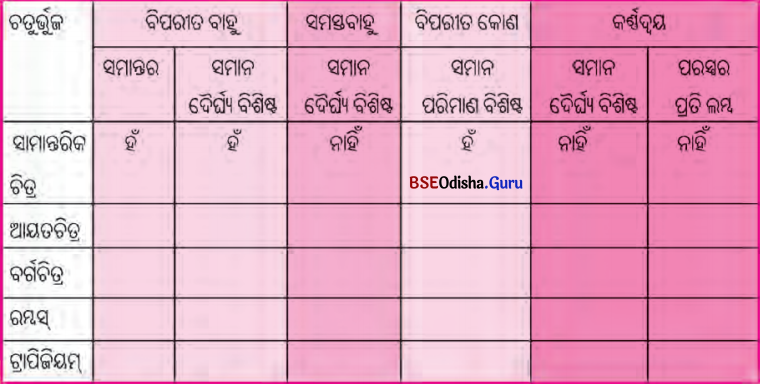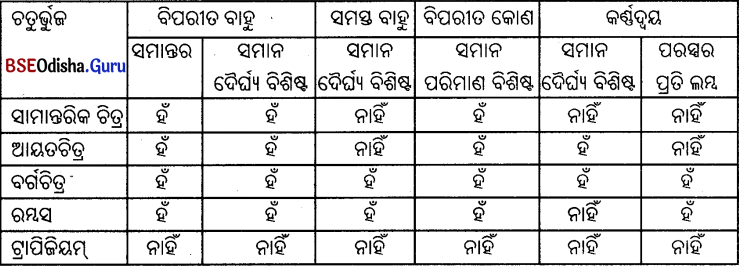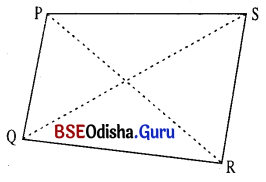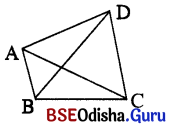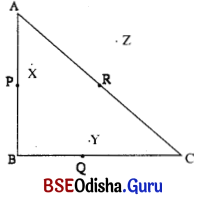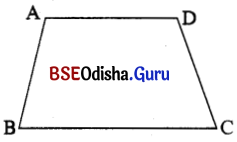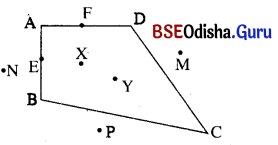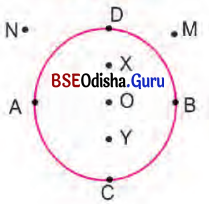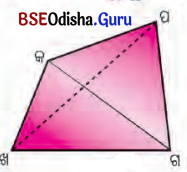Odisha State Board BSE Odisha 9th Class Odia Solutions Chapter 12 ସମୂହ ଦୃଷ୍ଟି Textbook Exercise Questions and Answers.
BSE Odisha Class 9 Odia Solutions Chapter 12 ସମୂହ ଦୃଷ୍ଟି
ପାଠ୍ୟପୁସ୍ତକସ୍ଥ ପ୍ରଶ୍ନାବଳୀର ଉତ୍ତର
ସଂକ୍ଷିପ୍ତ ଉତ୍ତରମୂ ଳକ ପ୍ରଶ୍ନୋତ୍ତର
Question ୧।
‘କ’ ସ୍ତମ୍ଭ ସହ ସମ୍ପର୍କ ଥିବା ଶବ୍ଦଟି ‘ଖ’ ସ୍ତମ୍ଭରୁ ବାଛି ମିଳାଇ ଲେଖ ।
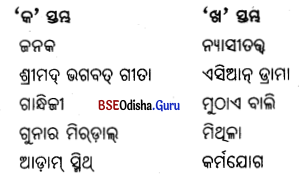
Answer:
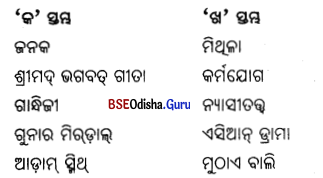
Question ୨।
‘ବ୍ରହ୍ମ’ ସହିତ ‘ଋଷି’ ଯୋଗହେଲେ ବ୍ରହ୍ମର୍ଷି ଶବ୍ଦ ହୋଇଥାଏ । ସେହିପରି ଶବ୍ଦ ଶେଷରେ ‘ଋଷି’ ଯୋଗ ହୋଇଥିବା ଆଉ ତିନୋଟି ଶବ୍ଦ ଲେଖ ।
Answer:
- ଦେବ + ଋଷି = ଦେବର୍ଷି
- ରାଜା + ଋଷି = ରାଜର୍ଷି
- ମହା + ଋଷି = ମହର୍ଷି
Question ୩ ।
ଅର୍ଥଗତ ପାର୍ଥକ୍ୟ ବାକ୍ୟରେ ଦର୍ଶାଅ ।
ପ୍ରାସାଦ, ପ୍ରସାଦ; ପନ୍ଥା, ପେନ୍ଥା; ଲକ୍ଷ, ଲକ୍ଷ୍ୟ; କୁଳ, କୂଳ ।
Answer:
ପ୍ରାସାଦ – ସେହି ନୀଳରଙ୍ଗର ପ୍ରାସାଦଟି ଚମତ୍କାର ଦିଶୁଛି ।
ପ୍ରସାଦ – ଦେବତାଙ୍କ ପ୍ରସାଦ ଅମୃତତୁଲ୍ୟ ଅଟେ ।
ପନ୍ଥା – ଲୋକମାନେ ଜୀବନଧାରଣପାଇଁ ବିଭିନ୍ନ ପନ୍ଥା ଅବଲମ୍ବନ କରନ୍ତି ।
ପେନ୍ଥା – ଗଛରେ ପେନ୍ଥା ପେନ୍ଥା ହୋଇ ଫୁଲ ଶୋଭାପାଉଛି ।
ଲକ୍ଷ – ମହାବାତ୍ୟାରେ ଲକ୍ଷ ଲକ୍ଷ ଲୋକ ଗୃହଶୂନ୍ୟ ହୋଇଗଲେ ।
ଲକ୍ଷ୍ୟ – ସମସ୍ତଙ୍କ ଲକ୍ଷ୍ୟ ମହତ୍ ହେବା ଉଚିତ ।
କୁଳ – ପ୍ରଭୁ ଶ୍ରୀରାମଚନ୍ଦ୍ର ରଘୁକୁଳରେ ଜନ୍ମଗ୍ରହଣ କରିଥିଲେ ।
କୂଳ – ସମୁଦ୍ର କୂଳରେ ବୁଲିବାପାଇଁ ସମସ୍ତେ ଭଲପାଆନ୍ତି ।

Question ୪।
‘ଧନସମ୍ପଦ’ ପରି ଆଉ ତିନୋଟି ଯୁଗ୍ମଶବ୍ଦ ଲେଖ ।
Answer:
ଟଙ୍କାପଇସା, ଧନରତ୍ନ, ଧନଦୌଲତ ।
Question ୫।
ନିମ୍ନଲିଖୂତ ଶବ୍ଦଗୁଡ଼ିକ ବ୍ୟବହାର କରି ବାକ୍ୟ ଗଠନ କର ।
ଉଦ୍ଭାସିତ, ପ୍ରବିଧି, ପ୍ରଭୂତ, ପ୍ରତିକୂଳ, ନିର୍ଲିପ୍ତ
Answer:
ଉଦ୍ଭାସିତ – ପ୍ରାବନ୍ଧିକଙ୍କ ପ୍ରତିଭା ପ୍ରଭାରେ ଓଡ଼ିଆ ସାହିତ୍ୟାକାଶ ହୋଇଛି ଉଦ୍ଭାସିତ ।
ପ୍ରବିଧୂ – ସମାଜର ଆବଶ୍ୟକତା ଅନୁଯାୟୀ ଜନନାୟକମାନେ ପ୍ରବିଧୂର ପରିବର୍ତ୍ତନ କରିଥା’ନ୍ତି ।
ପ୍ରଭୂତ – ଗ୍ରାମସମୂହର ବିକାଶ ନିମନ୍ତେ ସରକାର ପ୍ରଭୂତ ଅର୍ଥ ବିନିଯୋଗ କରୁଛନ୍ତି ।
ପ୍ରତିକୂଳ – ସ୍ରୋତର ପ୍ରତିକୂଳରେ ଗତି କରିବା କଷ୍ଟକର ।
ନିର୍ଲିପ୍ତ – ମୁନିଋଷିମାନେ ସଂସାରର ବିଷୟବାସନା ପ୍ରତି ନିର୍ଲିପ୍ତ ଥିଲେ ।
Question ୬।
ପ୍ରତିଶବ୍ଦ ଲେଖ ।
ଋଷି, ରାଜା, ପନ୍ଥା, ବିତ୍ତ, ସମୂହ, ଦରିଦ୍ର, ରଜନୀ
Answer:
ଋଷି – ସନ୍ନ୍ୟାସୀ, ତପସ୍ବୀ, ଯତି
ରାଜା – ଭୂପତି, ନରପତି, ନୃପତି
ପନ୍ଥା – ସରଣୀ, ମାର୍ଗ, ଉପାୟ
ବିତ୍ତ – ବିଭବ, ସମ୍ପଦ, ଧନ, ଅର୍ଥ
ସମୂହ – ସମଷ୍ଟି, ସମୁଚ୍ଚୟ, ସମସ୍ତ, ସକଳ
ଦରିଦ୍ର – ଦୀନ, ଗରିବ, ନିର୍ଜନ
ରଜନୀ – ଶର୍ବରୀ, ଯାମିନୀ, ବିଭାବରୀ
୭ । ବନ୍ଧନୀ ମଧ୍ଯରୁ ଉପଯୁକ୍ତ ଶବ୍ଦ ବାଛି ଶୂନ୍ୟସ୍ଥାନ ପୂରଣ କର ।
(କ) ଏଇ ଖଡ୍ଗ ମୋତେ କରିଛି __________________ । (ଶୃଙ୍ଖଳିତ, ସଂଯତ, ଅନାସକ୍ତ)
Answer:
ସଂଯତ
(ଖ) ଗାନ୍ଧିଜୀ ଏକ ପୂର୍ଣ୍ଣାଙ୍ଗ __________________ କଳ୍ପନା କରିଥିଲେ । (ଜୀବନ, ଯୋଜନା, ମାନବ)
Answer:
ମାନବ
(ଗ) ନ୍ୟାସୀବାଦର ପ୍ରଣୟନ ହୋଇଥିଲା ____________________ ମସିହାରେ । (୧୯୪୦, ୧୯୪୨, ୧୯୫୧)
Answer:
୧୯୪୦
କ୍ଷୁଦ୍ର ଉତ୍ତରମୂଳକ ପ୍ରଶ୍ନୋତ୍ତର
Question ୮।
ଆମ ଦେଶରେ ଆଧ୍ୟାମିକ ସଂସ୍କୃତି କିଏ ସୃଷ୍ଟି କରିଥିଲେ ?
Answer:
ପୁଣ୍ୟକ୍ଷେତ୍ର ଭାରତବର୍ଷ ଥିଲା ମୁନିଋଷିମାନଙ୍କର ଦେଶ । ସେମାନଙ୍କ ମଧ୍ୟରେ ଜାତିଭେଦ ନଥିଲା । ତପସ୍ୟା ବଳରେ ଅସାଧ୍ୟ ସାଧନ କରି ସେମାନେ ଏ ପବିତ୍ର ଦେଶରେ ଆଧ୍ୟାତ୍ମିକ ସଂସ୍କୃତି ସୃଷ୍ଟି କରିଥିଲେ ।

Question ୯।
ବିଶ୍ଵାମିତ୍ର ବ୍ରହ୍ମର୍ଷି ରୂପେ ସ୍ବୀକୃତି ଲାଭ ନ କରିବାରୁ କ’ଣ କଲେ ?
Answer:
ବିଶ୍ଵାମିତ୍ର ଥିଲେ ମହର୍ଷି । ତାଙ୍କ ହୃଦୟରେ ଥିଲା ବ୍ରହ୍ମର୍ଷି ହେବାର ଦୁର୍ବାର ଆକାଂକ୍ଷା, ମାତ୍ର ବ୍ରହ୍ମର୍ଷି ବଶିଷ୍ଠ ତାଙ୍କୁ ବ୍ରହ୍ମର୍ଷି ରୂପେ ସ୍ବୀକୃତି ନ ଦେବାରୁ ସେ ବଶିଷ୍ଠଙ୍କର ସମସ୍ତ ପୁତ୍ରଙ୍କୁ ହତ୍ୟା କରିଥିଲେ ।
Question ୧୦ ।
ଅତିଥ୍ ଜନକଙ୍କୁ ପ୍ରଥମେ ଅଭ୍ୟର୍ଥନା ସମୟରେ କ’ଣ କହିଥିଲେ ?
Answer:
ଅଭ୍ୟର୍ଥନା ସମୟରେ ଅତିଥୁ ଜନକଙ୍କୁ କହିଲେ ଯେ ସେ (ଜନକ) ଜଣେ ଭଣ୍ଡ ତପସ୍ବୀ । ଶଠତାରେ ସମସ୍ତଙ୍କୁ ବଶୀଭୂତ କରିବା ସହ ପ୍ରବଞ୍ଚନାରେ ଦିଗ୍ବିଜୟ କରିଛନ୍ତି । ବିରାଟ ରାଜ୍ୟର ବିସ୍ତର କ୍ଷମତା ତଥା ଅଖଣ୍ଡ ସମୃଦ୍ଧିର ଅଧିକାରୀ ହୋଇ ବିଳାସ ବ୍ୟସନରେ ବୁଡ଼ିରହି ତପସ୍ବୀ ରୂପେ ପ୍ରତିଷ୍ଠାର୍ଜନ କରିବା ଅସାଧାରଣ ପ୍ରତାରଣା ଅଟେ ।
Question ୧୧ ।
ଖାଦ୍ୟପେୟ ସମ୍ପର୍କରେ ଅତିଥୁଙ୍କର ମନ୍ତବ୍ୟ କ’ଣ ଥିଲା ?
Answer:
ଚର୍ଯ୍ୟ, ଚୋଷ୍ୟ, ଲେନ୍ଦ୍ୟ, ପେୟ ଆଦି ସମସ୍ତ ଖାଦ୍ୟପେୟ ରୁଚିକର, ତୃପ୍ତିକର ତଥା ଉପଭୋଗ୍ୟ ଥିଲେ ମଧ୍ୟ ମୁଣ୍ଡ ଉପରେ ଝୁଲୁଥିବା ତୀକ୍ଷ୍ଣଣ ଖଡ୍ଗ ଦେଖୁ ସେ ଖାଦ୍ୟକୁ ଗିଳି ପକାଇଥଲେ, ଉପଭୋଗ କରିପାରି ନଥିଲେ ବୋଲି ଅତିଥୁ ମନ୍ତବ୍ୟ ଦେଇଥିଲେ ।
Question ୧୨ ।
ଭଗବତ୍ତାର କର୍ମଯୋଗ ଅଧ୍ୟାୟରେ କ’ଣ ଲେଖାଯାଇଛି ?
Answer:
ଭଗବତ୍ତାର କର୍ମଯୋଗ ଅଧ୍ୟାୟରେ ଲେଖାଅଛି –
‘କର୍ମଶୈବ ହି ସଂସିଦ୍ଧିମାସ୍ଥିତା ଜନକାଦୟଃ ।’’
Question ୧୩ ।
ଆଧୁନିକ ଯୁଗରେ ଆଡ଼ାମ୍ ସ୍ମିଥ୍ କ’ଣ ଲେଖୁଥିଲେ ?
Answer:
ଆଧୁନିକ ଯୁଗରେ ଆଡ଼ାମ୍ ସ୍ମିଥ ଲେଖୁଥିଲେ, ‘କୌଣସି ଲୋକକୁ ମୁଠାଏ ବାଲି ଦେଇ, ପ୍ରତିଶ୍ରୁତି ଦିଅ – ଏ ବାଲି ତୁମର – ସେ ଲୋକ ଏ ବାଲିମୁଠାକ ସୁନାରେ ପରିଣତ କରିଦେବ ।’’
Question ୧୪ ।
ମହାତ୍ମା ଗାନ୍ଧିଙ୍କ ସକଳ କର୍ମର ମୂଳଭିତ୍ତି କ’ଣ ଥିଲା ?
Answer:
ମହାତ୍ମା ଗାନ୍ଧିଙ୍କ ସକଳ କର୍ମର ମୂଳଭିତ୍ତି ଥିଲା ସତ୍ୟ ଏବଂ ଅହିଂସା । ଆନ୍ଦୋଳନ, ଅଭିଯାନ, ରାଜନୀତି, ଅର୍ଥନୀତି, ସକଳ କ୍ଷେତ୍ରରେ ଏହି ଦୁଇଟି ତତ୍ତ୍ବ ଥିଲା ତାଙ୍କର ଆୟୁଧ ।

Question ୧୫ ।
ଗାନ୍ଧିଜୀଙ୍କ ନ୍ୟାସୀବାଦ କ’ଣ ?
Answer:
ଧନୀ, ଶିଳ୍ପପତି ଓ ବ୍ୟବସାୟୀମାନେ ସେମାନଙ୍କ ସମ୍ପତ୍ତି, ଶିଳ୍ପ ଓ ବ୍ୟବସାୟର ମାଲିକ ଭାବେ ରହି ତା’ର ପରିଚାଳନା କରିବେ । ନିଜ ପାଇଁ ତଥା ପରିବାର ପାଇଁ ଆବଶ୍ୟକ ଅର୍ଥ ବ୍ୟୟ କରିବା ପରେ ଉଦ୍ବୃତ୍ତ ଲାଭାଂଶକୁ ବାଧ୍ୟବାଧକତାରେ ନୁହେଁ ସେମାନଙ୍କ ସ୍ୱେଚ୍ଛାରେ ସମାଜର ହିତ କାର୍ଯ୍ୟରେ ବ୍ୟୟ କରାଯିବ । ସେମାନେ ହେବେ ସମାଜର ନ୍ୟାସୀ – ଏହାହିଁ ଥିଲା ଗାନ୍ଧିଜୀଙ୍କ ନ୍ୟାସୀବାଦ ।
Question ୧୬ ।
ପଞ୍ଚବାର୍ଷିକ ଯୋଜନାରେ କ’ଣ ନିର୍ଦ୍ଦେଶିତ ହୋଇଛି ?
Answer:
ଧନୀ ଦରିଦ୍ର ମଧ୍ୟରେ ବ୍ୟବଧାନ ହ୍ରାସ କରିବା ସହିତ ଦେଶର ଆୟ ଓ ସମ୍ପଦ ମୁଷ୍ଟିମେୟ ଲୋକଙ୍କ ହାତରେ କେନ୍ଦ୍ରୀଭୂତ ହେବ ନାହିଁ ବୋଲି ପଞ୍ଚବାର୍ଷିକ ଯୋଜନାରେ ଅଭୀଷ୍ଟ ନିର୍ଦ୍ଦେଶିତ ହୋଇଛି ।
Question ୧୭ ।
ଷଷ୍ଠ ଯୋଜନା ରିପୋର୍ଟରେ କ’ଣ କୁହାଯାଇଛି ?
Answer:
ଧନୀ ଦରିଦ୍ର ମଧ୍ୟରେ ତାରତମ୍ୟ ବଢ଼ିଚାଲିବା ସହ ସମ୍ପଦ ଅଧିକମାତ୍ରାରେ ସମୃଦ୍ଧ ଲୋକଙ୍କ ହାତରେ କେନ୍ଦ୍ରୀଭୂତ ହେଉଛି ଏବଂ ଏହି ପ୍ରକ୍ରିୟା ଅବିରତ ଲାଗିରହିଛି ବୋଲି ଷଷ୍ଠ ଯୋଜନା ରିପୋର୍ଟରେ କୁହାଯାଇଛି ।
Question ୧୮ ।
ଯୋଜନାର ପ୍ରକୃତ ଲକ୍ଷ୍ୟ କ’ଣ ଥିଲା ?
Answer:
ଯୋଜନାର ପ୍ରକୃତ ଲକ୍ଷ୍ୟ ଥିଲା ବେକାରି ସମସ୍ୟା ସମାଧାନ, ଦାରିଦ୍ର୍ୟ ଦୂରୀକରଣ, ଲୋକଙ୍କ ସର୍ବନିମ୍ନ ଆବଶ୍ୟକତା ପରିପୂରଣ ତଥା ସମାଜର କଲ୍ୟାଣ ଓ ସାମୂହିକ ବିକାଶ ।
Question ୧୯ ।
କେଉଁ ଅଭାବ ପାଇଁ ଯୋଜନାର ଉଦ୍ଦେଶ୍ୟ ପରିପୂରଣ ହୋଇପାରିଲା ନାହିଁ ?
Answer:
ଆଗ୍ରହ, ଆଭିମୁଖ୍ୟ ଏବଂ ଆନ୍ତରିକତାର ଅଭାବ ପାଇଁ ଯୋଜନାର ଉଦ୍ଦେଶ୍ୟ ପରିପୂରଣ ହୋଇପାରିଲା ନାହିଁ ।
Question ୨୦ ।
ନରମା ରାଷ୍ଟ୍ରର ବିଶେଷ ଲକ୍ଷଣ କ’ଣ ?
Answer:
ନରମା ରାଷ୍ଟ୍ରର ବିଶେଷ ଲକ୍ଷଣ ହେଲା ସାମାଜିକ ଶୃଙ୍ଖଳାର ଅଭାବ । ଯେ କୌଣସି ବ୍ୟବସ୍ଥା ବା ନିର୍ଦ୍ଦେଶ ପ୍ରଣୟନ କରାଗଲେ ତାକୁ ଅମାନ୍ୟ କରିବା ହୋଇଛି ପ୍ରତ୍ୟେକଙ୍କର ସ୍ୱଭାବ ଏବଂ କର୍ମରେ ଅବହେଳା ତଥା ଆଦେଶର ପ୍ରତିରୋଧ କରିବା ଏକ ସାଧାରଣ ପ୍ରବୃତ୍ତିରେ ପରିଣତ ହୋଇଛି । ଏହା ଦେଶର ଅଗ୍ରଗତି ପାଇଁ ପ୍ରତିକୂଳ ଅଟେ ।
Question ୨୧ ।
କ୍ଷମତାର ହସ୍ତାନ୍ତର ପୂର୍ବରୁ ନେତୃ ମହଲରେ ଗାନ୍ଧିଜୀ କ’ଣ ଲକ୍ଷ୍ୟ କରିଥିଲେ ?
Answer:
କ୍ଷମତାର ହସ୍ତାନ୍ତର ପୂର୍ବରୁ ନେତୃ ମହଲରେ ସମୂହ ଦୃଷ୍ଟି ପରିବର୍ତ୍ତେ ସ୍ବାର୍ଥଦୃଷ୍ଟି ବିଶେଷଭାବରେ ପ୍ରକଟିତ ହୋଇଥିବାର ଗାନ୍ଧିଜୀ ଲକ୍ଷ୍ୟ କରିଥିଲେ ।
Question ୨୨ ।
ଗାନ୍ଧିଜୀଙ୍କ ପରିକଳ୍ପିତ ସମାଜ କିପରି ଥିଲା ?
Answer:
ଗାନ୍ଧିଜୀଙ୍କ ପରିକଳ୍ପିତ ସମାଜ ଥିଲା ଶୋଷଣ ଓ ଅନାଚାରବିହୀନ ତଥା ବିଚାର ଓ ସମନ୍ଵୟଯୁକ୍ତ ସୁସ୍ଥ ସମାଜ, ଏକ ସମୂହ ପରିବାର ।

Question ୨୩ ।
ବର୍ତ୍ତମାନ ସମାଜ ଦୃଷ୍ଟି ସ୍ଥାନରେ କ’ଣ ପରିଲକ୍ଷିତ ହେଉଛି ?
Answer:
ବର୍ତ୍ତମାନ ସମାଜ ଦୃଷ୍ଟି ସ୍ଥାନରେ କ୍ଷମତାର ସଂଘର୍ଷ ତଥା ଉତ୍କଟ ଆତ୍ମସେବା ତେଜି ଉଠୁଥିବାର ପରିଲକ୍ଷିତ ହେଉଛି ।
Question ୨୪ ।
ଇତିହାସ ବାରମ୍ବାର କେଉଁ ପ୍ରକାର ଚେତାବନୀ ଦେଇଛି ?
Answer:
ଇତିହାସ ବାରମ୍ବାର ଚେତାବନୀ ଦେଇଛି – ସଂକଟ, ସଂଘର୍ଷ ଏବଂ ପ୍ରତାରଣାରୁ ଉଦ୍ଭୂତ ହୁଏ ଅବାଞ୍ଛନୀୟ ପ୍ରତିକ୍ରିୟା ।
ସପ୍ରସଙ୍ଗ ସରଳାର୍ଥ ଲେଖ
Question ୨୫ ।
ଏଇ ଖଡ୍ଗ ମୋତେ ଅନାସକ୍ତି ଯୋଗରେ ଦୀକ୍ଷିତ କରିଛି ।
Answer:
ଏଇ ଖଡ୍ଗ ………………………….. ଦୀକ୍ଷିତ କରିଛି ।
ଉପରୋକ୍ତ ଗଦ୍ୟାଶଟି ପଠିତ ‘ସମୂହ ଦୃଷ୍ଟି’ ପ୍ରବନ୍ଧରୁ ସଂଗୃହୀତ । ଏଠାରେ ପ୍ରାବନ୍ଧିକ ପଦ୍ମଶ୍ରୀ ସଦାଶିବ ମିଶ୍ର ରାଜର୍ଷି ଜନକଙ୍କ ଆସକ୍ତିବିହୀନ କର୍ମଯୋଗ ଉପରେ ଆଲୋକପାତ କରିଛନ୍ତି ।
‘ଏଇ ଖଡ୍ଗ ମୋତେ ଅନାସକ୍ତି ଯୋଗରେ ଦୀକ୍ଷିତ କରିଛି ।’ରାଜର୍ଷି ଜନକଙ୍କର ଏହି ଉକ୍ତିଟି ଅତିଥିରୂପୀ ଯତିବରଙ୍କ ଉଦ୍ଦେଶ୍ୟରେ ଅଭିପ୍ରେତ ଥିଲା । ପ୍ରାସାଦ ସମ୍ମୁଖରେ ଋଷିବରଙ୍କୁ ଦେଖ୍ ଅଭ୍ୟର୍ଥନା ପୂର୍ବକ ଅତିଥୁ କକ୍ଷକୁ ଆଣିବା ପରେ ସେହି ଋଷିବର ରାଜର୍ଷି ଜନକଙ୍କୁ ଭଣ୍ଡ, ଶଠ ଏବଂ ପ୍ରବଞ୍ଚନାରେ ଦିଗ୍ବିଜୟ କରିଛନ୍ତି ବୋଲି କହି ଭତ୍ସନା କରିଛନ୍ତି । ବିରାଟ ରାଜ୍ୟର ଅଧୀଶ୍ଵର ତଥା ବିସ୍ତର କ୍ଷମତାର ଅଧୂପତି ହୋଇ ବିପୁଳ ବିଭବ, ଅଖଣ୍ଡ ସମୃଦ୍ଧି ଓ ବିଳାସବ୍ୟସନ ମଧ୍ୟରେ ବୁଡ଼ିରହି ତପସ୍ବୀର ପ୍ରତିଷ୍ଠା ଅର୍ଜନ କରିବା ଅସାଧାରଣ ପ୍ରତାରଣା ବୋଲି ରାଜର୍ଷି ଜନକଙ୍କୁ କଟୁବାଣୀ ଶୁଣାଇଛନ୍ତି ।
କିନ୍ତୁ ରାଜର୍ଷି ଜନକ ନମ୍ରତାପୂର୍ବକ ଧୀରସ୍ଥିର ଭାବରେ ଋଷିବରଙ୍କୁ ଅତିଥ୍ୟସେବାରୂପକ ପବିତ୍ର ଧର୍ମ ପାଳନରୁ ତାଙ୍କୁ ବଞ୍ଚତ ନ କରିବାକୁ ନିବେଦନ କରିଛନ୍ତି । ଅତିଥ୍ୟ ପ୍ରବର ରାଜକୀୟ ସମାରୋହରେ ନିତ୍ୟକର୍ମ ତଥା ମଧ୍ୟାହ୍ନ ଭୋଜନ ସମାପ୍ତ କରିବା ପରେ ରାଜର୍ଷି ଜନକ ତାଙ୍କୁ ଖାଦ୍ୟପେୟ ସମ୍ପର୍କରେ ପ୍ରଶ୍ନ କଲେ । କିନ୍ତୁ ଅତିଥୁ ଚର୍ଜ୍ୟ, ଚୋଷ୍ୟ, ଲେହ୍ୟ, ପେୟ ସମସ୍ତ ଭୋଜନ ରୁଚିକର, ତୃପ୍ତିକର ତଥା ଉପଭୋଗ୍ୟ ଥିଲେ ମଧ୍ୟ ଭୋଜନ ସ୍ଥାନରେ ମସ୍ତକ ଉପରେ ଝୁଲୁଥିବା ଖଡ୍ଗ ଦେଖୁ ତାହା ଉପଭୋଗ କରିନପାରି ଗିଳିଦେଇଥିଲେ ବୋଲି ପ୍ରକାଶ କରିବା ସହ ଖଡ୍ଗ ଝୁଲିବାର କାରଣ ଜାଣିବାକୁ ଚାହିଁଥିଲେ ।
ସେହି ଖଡ୍ଗ ହିଁ ତାଙ୍କୁ ଉପଭୋଗରେ ନିର୍ଲିପ୍ତ ଓ ସଂଯତ କରିଛି ବୋଲି ଜନକ ଉତ୍ତର ଦେଇଥିଲେ । ମିଥିଳା ରାଜ୍ୟ ଭସ୍ମୀଭୂତ ହେଲେ ମଧ୍ୟ ତାଙ୍କର ବ୍ୟକ୍ତିଗତ ଭାବେ କିଛି ଲାଭ ବା କ୍ଷତି ହେବ ନାହିଁ । ସେ ମିଥୁଳାର ରାଜା । ହାତରେ ଥିବା ଶାସନ ଦଣ୍ଡ ପ୍ରଜାଙ୍କ ମଙ୍ଗଳ ପାଇଁ ଉଦ୍ଦିଷ୍ଟ । ଉପଭୋଗ ତାଙ୍କର ରାଜକୀୟ ମର୍ଯ୍ୟାଦା ( ଶାସନ ଓ ଶୃଙ୍ଖଳା ହେଉଛି ରାଜକୀୟ କର୍ତ୍ତବ୍ୟ । ସମାଜ କଲ୍ୟାଣ ରାଜକୀୟ ଧର୍ମ । କର୍ତ୍ତବ୍ୟ ପରିପାଳନର ସେହି ଖଡ୍ଗ ହିଁ ତାଙ୍କୁ ବ୍ୟକ୍ତିଗତ ଅନାସକ୍ତି ଯୋଗରେ ଦୀକ୍ଷିତ କରିଛି ବୋଲି ଜନକ କହିଥିଲେ ।
Question ୨୬ ।
ସାଧନାରେ, ତପସ୍ୟାରେ, କାମନାସିଦ୍ଧି ଥିଲା ଅଭିପ୍ରେତ ।
Answer:
ସାଧନାରେ ……………………………….. ଅଭିପ୍ରେତ ।
ଉକ୍ତ ଗଦ୍ୟାଶଟି ସଦାଶିବ ମିଶ୍ରଙ୍କ ରଚିତ ‘ସମୂହ ଦୃଷ୍ଟି’ ପ୍ରବନ୍ଧରୁ ସମାନୀତ । ଏଠାରେ ପ୍ରାବନ୍ଧିକ ପ୍ରତିଟି କାର୍ଯ୍ୟ ମୂଳରେ କାମନା କିପରି ସନ୍ନିହିତ ଅଛି, ତାହା ଉପସ୍ଥାପନ କରିଛନ୍ତି ।
ଶ୍ରୀମଦ୍ ଭଗବତ୍ ଗୀତାର କର୍ମଯୋଗରେ ଲେଖାଅଛି, ‘କର୍ମଶୈବ ହି ସଂସିଦ୍ଧିମାସ୍ଥିତ ଜନକାଦୟ ।’ ଅର୍ଥାତ୍ କର୍ମଦ୍ଵାରାହିଁ ଜନକାଦି ମହାପୁରୁଷମାନେ ସିଦ୍ଧିଲାଭ କରିଛନ୍ତି । ସେ କର୍ମରେ ଥିଲା କର୍ତ୍ତବ୍ୟବୋଧ, ନଥିଲା ବ୍ୟକ୍ତିଗତ ଫଳପ୍ରାପ୍ତିର ଲାଳସା, ନଥିଲା । ଧନ, ଯଶ, ଜନ ଦିଅ ବୋଲି ଆଉଁ ପ୍ରାର୍ଥନା, ବରଂ ସେ କର୍ତ୍ତବ୍ୟରେ ଥିଲା ଜନମଙ୍ଗଳ, ସମାଜ କଲ୍ୟାଣ ତଥା ବ୍ୟକ୍ତିଗତ ଅନାସକ୍ତି ।
କିନ୍ତୁ ଫଳପ୍ରାପ୍ତିର ଆକାଙ୍କ୍ଷା ନଥୁଲେ କର୍ମ ଲାଗି ପ୍ରବୃତ୍ତି ଆସେ ନାହିଁ । ପାରିତୋଷିକ ନଥିଲେ ପ୍ରେରଣା ଆସେ ନାହିଁ । ଲାଭ ନଥୁଲେ କେହି ବଣିଜ କରିବ ନାହିଁ । ସୁତରାଂ ନିଷ୍କାମ କର୍ମ ସମ୍ଭବ ନୁହେଁ । ଏହି ବିଚାର ରାମାୟଣ, ମହାଭାରତ ପ୍ରଭୃତି ପ୍ରାଚୀନ ଯୁଗରେ ଥିଲା ଏବେ ମଧ୍ୟ ରହିଛି, ସବୁବେଳେ ରହିଥବ । ମୁନିଋଷିମାନଙ୍କ ସାଧନା ତଥା ତପସ୍ୟାରେ ମଧ୍ଯ କାମନା- ସିଦ୍ଧି ଥୁଲା ଅଭିପ୍ରେତ । ଆଧୁନିକ ଯୁଗରେ ଆଡ଼ାମ୍ ସ୍ମିଥ୍ ମଧ୍ୟ ଲେଖୁଥିଲେ– କୌଣସି ଲୋକଙ୍କୁ ମୁଠାଏ ବାଲି ଦେଇ, ସେହି ବାଲି ତା’ର ବୋଲି ପ୍ରତିଶ୍ରୁତି ଦେଲେ, ସେ ଲୋକ ସେହି ବାଲିମୁଠାକ ସୁନାରେ ପରିଣତ କରିଦେବ । ସୁତରାଂ ଧନସମ୍ପଦ, ମାନମର୍ଯ୍ୟାଦା, ଶକ୍ତି ଓ କ୍ଷମତା ହେଉଛି ପ୍ରେରଣାର ଉତ୍ସ । କାର୍ଯ୍ୟ ସାଧନର ମାଧ୍ଯମ, ତଥାପି ସେସବୁ ମଧ୍ୟରେ ସମାଜ ପ୍ରତି ଦାୟିତ୍ବବୋଧ ଥିଲା ସନ୍ନିହିତ । ସେଥୁରୁ ସେମାନେ କେବେ ବିଚ୍ୟୁତ ହୋଇ ନଥିଲେ ।

Question ୨୭ ।
ଆଦର୍ଶକୁ ନିର୍ମୂଳ କଲେ ଆକ୍ରମଣ କରେ ପ୍ରତାରଣା ।
Answer:
ଆଦର୍ଶକୁ………………………………………ପ୍ରତାରଣା
ଉକ୍ତ ଗଦ୍ୟାଶଟି ପଠିତ ‘ସମୁହ ଦୃଷ୍ଟି’ ପ୍ରବନ୍ଧରୁ ସଂଗୃହୀତ । ଏଠାରେ ଲେଖକ ପଦ୍ମଶ୍ରୀ ସଦାଶିବ ମିଶ୍ର ଆଦର୍ଶକୁ ପରିହାର କଲେ ଶଠତା କିପରି ଆକ୍ରମଣ କରି ସାମାଜିକ ସଙ୍କଟ ସୃଷ୍ଟି କରେ, ତାହା ଉପସ୍ଥାପନ କରିଛନ୍ତି ।
ମହାତ୍ମା ଗାନ୍ଧି ଗଢ଼ିବାକୁ ଚାହୁଁଥିଲେ ଏକ ସୁସ୍ଥ ସମାଜ, ଏକ ସମୂହ ପରିବାର । ଯେଉଁଠାରେ ନଥୁବ ଶୋଷଣ, ଅନାଚାର, ଥବ ବିଚାର ଓ ସମନ୍ୱୟ । ସେ ଏକ ପୂର୍ଣ୍ଣାଙ୍ଗ ମାନବର ପରିକଳ୍ପନା କରିଥିଲେ, ଯେଉଁଥରେ ନୈତିକତା, ଅର୍ଥନୀତି, ରାଜନୀତି ଓ ସମାଜଦୃଷ୍ଟି ସମନ୍ବିତ ହୋଇ ରହିଥିଲା । ତାଙ୍କ ଚିନ୍ତା, କଳ୍ପନା, ଭାଷଣ ଓ ରଚନା ଥିଲା ଗୋଟିଏ ସୃଷ୍ଟିର ସମାହାର । କାରଣ ତାଙ୍କ ପରିକଳ୍ପନାର ମୂଳମନ୍ତ୍ର ଥିଲା ସମୂହ ଦୃଷ୍ଟି ଓ ସମାଜ ପାଇଁ ଆୟୋତ୍ସର୍ଗ । ମହାତ୍ମାଜୀଙ୍କ ଏହି ବିଚାର, ଆଦର୍ଶ ଓ ସମୂହ ଦୃଷ୍ଟିକୁ ଭୁଲିଯାଇ ତାଙ୍କ ଦାୟାଦମାନେ ତାଙ୍କ ଲେଖାକୁ ଉଦ୍ଧାର କରି ନିଜ ସୁବିଧା ଅନୁଯାୟୀ ପ୍ରଚାର କରୁଛନ୍ତି । ଗାନ୍ଧିଙ୍କ ବଚନକୁ ପ୍ରବଚନ ରୂପେ ପ୍ରଚାର କରି ସେସବୁକୁ ବିବୃତିରେ ପରିଣତ କରିଛନ୍ତି ।
ସମାଜ ଦୃଷ୍ଟି ସ୍ଥାନରେ ତେଜିଉଠିଛି କ୍ଷମତାର ସଂଘର୍ଷ ତଥା ଉତ୍କଟ ଆତ୍ମସେବା । ତାଙ୍କ ନ୍ୟାସୀତତ୍ତ୍ଵକୁ ଭୁଲି, ତାଙ୍କ ବିଚାରକୁ ପରିହାର କରି, ରଚନାକୁ ସାମୟିକ ଉଦ୍ଧାର କରି ସ୍ଵାର୍ଥସିଦ୍ଧି କରିବାର ପ୍ରଚେଷ୍ଟା ସୃଷ୍ଟି କରିଛି ଏକ ସାମାଜିକ ସଙ୍କଟ । ଭୁଲିଯାଇଛନ୍ତି ସେମାନେ ଗାନ୍ଧିଜୀଙ୍କର ସେହି ମହାନ୍ ଆଦର୍ଶକୁ । ଆଦର୍ଶ ନିର୍ମୂଳ ହେଲେ ପ୍ରତାରଣାର ଆକ୍ରମଣ ସୁନିଶ୍ଚିତ । ସେହି ସଙ୍କଟ, ସଂଘର୍ଷ ଓ ପ୍ରତାରଣାରୁ ସମାଜରେ ଅବାଞ୍ଛନୀୟ ପ୍ରତିକ୍ରିୟା ଆତ୍ମପ୍ରକାଶ କରେ ବୋଲି ଇତିହାସ ବାରମ୍ବାର ଚେତାବନୀ ଦେଇଛି । ସୁତରାଂ ଆଦର୍ଶକୁ ପରିହାର ନକରି ଆଦର୍ଶକୁ ଅନୁସରଣ କରିବାପାଇଁ ପ୍ରାବନ୍ଧିକ ଏଠାରେ ପରାମର୍ଶ ଦେଇଛନ୍ତି ।
Question ୨୮ ।
କର୍ମରେ ଅବହେଳା ଏବଂ ଆଦେଶର ପ୍ରତିରୋଧ ବିଭିନ୍ନ ବିଭାଗରେ, ବିଭିନ୍ନ ସ୍ତରରେ ଏକ ସାଧାରଣ ପ୍ରବୃତ୍ତି ।
Answer:
କର୍ମରେ …………………………………………… ପ୍ରବୃତ୍ତି
ଉକ୍ତ ଗଦ୍ୟାଶଟି ପଦ୍ମଶ୍ରୀ ସଦାଶିବ ମିଶ୍ରଙ୍କ ରଚିତ ‘ସମୂହ ଦୃଷ୍ଟି’ ଶୀର୍ଷକ ପ୍ରବନ୍ଧରୁ ସଂଗୃହୀତ । ଏଠାରେ ପ୍ରାବନ୍ଧିକ ସାମ୍ପ୍ରତିକ ସମାଜରେ ମାନବ ହୃଦୟରେ ଦେଖାଦେଇଥିବା ସାମାଜିକ ବିଶୃଙ୍ଖଳା କିପରି ତା’ର ବିକାଶରେ ହୋଇଛି ମୁଖ୍ୟ ପ୍ରତିବନ୍ଧକ, ତାହା ଉପସ୍ଥାପନ କରିଛନ୍ତି ।
ପ୍ରଖ୍ୟାତ ଅର୍ଥନୀତିଜ୍ଞ ଗୁନାର ମିର୍ଡ଼ାଲ୍ ତାଙ୍କ ନୋବେଲ ପୁରସ୍କାରପ୍ରାପ୍ତ ‘ଏସିଆନ୍ ଡ୍ରାମା’ ସନ୍ଦର୍ଭରେ ‘ନରମା ରାଷ୍ଟ୍ର’ ସମ୍ପର୍କରେ ଆଲୋଚନା କରିଛନ୍ତି । ତାଙ୍କ ମତରେ ଭାରତ ପରି ମନ୍ଦ ବିକଶିତ ଦେଶରେ ଅଛି ନରମା ରାଷ୍ଟ୍ର । ଯେଉଁ ଦେଶର ଯୋଜନାରେ ଅଛି ମନ୍ଦହାସର ଆକର୍ଷଣ, ନାହିଁ ସ୍ନିଗ୍ଧହାସର ଅନୁରାଗ । ସାମାଜିକ ଶୃଙ୍ଖଳାର ଅଭାବ ହିଁ ନରମ ରାଷ୍ଟ୍ରର ବିଶେଷ ଲକ୍ଷଣ । କୌଣସି ବ୍ୟବସ୍ଥା ବା ନିର୍ଦେଶ ପ୍ରଣୟନ କରାଗଲେ ଉଚ୍ଚ-ନୀଚ, ଶିକ୍ଷିତ-ଅଶିକ୍ଷିତ ସକଳ ସ୍ତରରେ ତାକୁ ଅମାନ୍ୟ କରିବା ସ୍ୱଭାବରେ ପରିଣତ ହୋଇଛି ।
କର୍ମରେ ଅବହେଳା, ଆଦେଶର ପ୍ରତିରୋଧ ବିଭିନ୍ନ ବିଭାଗରେ, ବିଭିନ୍ନ ସ୍ତରରେ ହୋଇଛି ଏକ ସାଧାରଣ ପ୍ରବୃତ୍ତି । ସାମାଜିକ ପ୍ରତିଷ୍ଠା କିମ୍ବା ରାଜନୈତିକ କ୍ଷମତା ଥିବା ବ୍ୟକ୍ତି ଅବାଧରେ କରିଚାଲିଛି ସ୍ଵାର୍ଥସିଦ୍ଧି । ଏପରି ନରମା ରାଷ୍ଟ୍ରରେ ଅର୍ଥନୈତିକ ବିକାଶ ପ୍ରତିହତ ହେବା ସ୍ଵାଭାବିକ । କାରଣ ଅଗ୍ରଗତି ପାଇଁ ଏପରି ପରିବେଶ ଅତ୍ୟନ୍ତ ପ୍ରତିକୂଳ । ତେଣୁ ଏହି ବିଶୃଙ୍ଖଳାକୁ ପରିହାର କରି ଶୃଙ୍ଖଳିତ ଭାବରେ ଦେଶକୁ ବିକାଶ ପଥରେ ଆଗେଇ ନେବା
ଦୀର୍ଘ ଉତ୍ତରମୂଳକ ପ୍ରଶ୍ନୋତ୍ତର
Question ୨୯ ।
ଗାନ୍ଧିଜୀଙ୍କ ନ୍ୟାସୀତତ୍ତ୍ବ କ’ଣ ଓ ଏହାର ମୂଳ ଉଦ୍ଦେଶ୍ୟ ସମ୍ପର୍କରେ ଆଲୋଚନା କର ।
କିମ୍ବା, ନ୍ୟାସୀବାଦ କିଏ ଓ କେତେବେଳେ ପ୍ରଣୟନ କରିଥିଲେ ଓ କାହିଁକି ?
କିମ୍ବା, ଗାନ୍ଧିଜୀଙ୍କ ନ୍ୟାସୀତତ୍ତ୍ବ ଆମ ଦେଶରେ କେଉଁ ପୃଷ୍ଠଭୂମିରେ ଆତ୍ମପ୍ରକାଶ କରିଥିଲା ଓ ଏହାର ଉଦ୍ଦେଶ୍ୟ କ’ଣ ଥିଲା ?
Answer:
ସ୍ବାଧୀନତା ପରବର୍ତ୍ତୀ ଓଡ଼ିଆ ପ୍ରବନ୍ଧ ସାହିତ୍ୟ କ୍ଷେତ୍ରରେ ପଦ୍ମଶ୍ରୀ ସଦାଶିବ ମିଶ୍ର ଜଣେ ଚିନ୍ତାବାଦୀ, ମୂଲ୍ୟବୋଧବାଦୀ ତଥା ଐତିହ୍ୟବାଦୀ ପ୍ରାବନ୍ଧିକ ସମ୍ମାନରେ ହୋଇଛନ୍ତି ବିଭୂଷିତ । ସେ ଥିଲେ ଏକାଧାରରେ ଜଣେ ବିଶିଷ୍ଟ ଶିକ୍ଷାବିତ୍, ପ୍ରବୀଣ ରାଜନୀତିଜ୍ଞ, ବରିଷ୍ଠ ଅର୍ଥନୀତିଜ୍ଞ, ସୁସାହିତ୍ୟିକ ତଥା ସର୍ବୋତ୍ତମ ପ୍ରଶାସକ । ତାଙ୍କ ଲେଖନୀ ନିଃସୃତ ‘ମାତୃପୂଜା ମଣ୍ଡପ’, ‘ଅର୍ଥ ଓ ଅର୍ଥାନ୍ତର’, ‘ମାର୍କିନ୍ ପରିକ୍ରମା’, ‘ଆଲୋକର ସନ୍ଧାନ’ ପ୍ରଭୃତି କୃତିରାଜି ସ୍ବୀୟ ମନନଧର୍ମୀ ରଚନାଶୈଳୀ, କ୍ଷୁଦ୍ରବାକ୍ୟ, ସହଜ, ସରଳ ଓ ସ୍ବତଃସ୍ଫୁର୍ଭ ଭାଷା ତଥା ଦୃଷ୍ଟାନ୍ତଧର୍ମୀ ପରିବେଷଣର ରମଣୀୟ ଆକର୍ଷଣରେ ଲାଭକରିଛି ବିପୁଳ ପାଠକୀୟ ସ୍ବୀକୃତି ।
‘ସମୂହ ଦୃଷ୍ଟି’ ପ୍ରବନ୍ଧରେ ପ୍ରାବନ୍ଧିକ ସ୍ବୀୟ ମୌଳିକ ବିଚାରଧାରାର ବିଶ୍ଳେଷଣ କଲାବେଳେ ପ୍ରସଙ୍ଗକ୍ରମେ ଗାନ୍ଧିଜୀଙ୍କ ନ୍ୟାସୀତତ୍ତ୍ଵ ତଥା ତା’ର ଉଦ୍ଦେଶ୍ୟ ସମ୍ପର୍କରେ ଆଲୋଚନା କରିଛନ୍ତି । ଗାନ୍ଧିଜୀଙ୍କ ନ୍ୟାସୀତତ୍ତ୍ଵ ହେଲା– ଧନୀ, ଶିଳ୍ପପତି ଓ ବ୍ୟବସାୟୀମାନେ ସେମାନଙ୍କ ସମ୍ପତ୍ତି, ଶିଳ୍ପ ତଥା ବ୍ୟବସାୟର ମାଲିକ ରହିବେ । ସେଥୁରୁ ସେମାନଙ୍କୁ ବିଚ୍ୟୁତ କରାଯିବ ନାହିଁ; ବରଂ ସେଗୁଡ଼ିକର ପରିଚାଳନାର ସଫଳତାରେ ସେମାନେ ହେବେ ଗୌରବାନ୍ବିତ । ସେମାନଙ୍କର ପରିବାର ପାଇଁ ତଥା ନିଜ ପାଇଁ ଆବଶ୍ୟକ ଅର୍ଥ ବ୍ୟୟ କରିବା ପରେ ଉଦ୍ବୃତ୍ତ ଲାଭାଂଶକୁ ସେମାନଙ୍କ ସ୍ୱେଚ୍ଛାରେ ସମାଜର ହିତାର୍ଥରେ ବ୍ୟୟ କରାଯିବ, ବାଧ୍ୟବାଧକତାରେ ନୁହେଁ । ଏଥିଲାଗି ସେମାନେ ହେବେ ସମାଜର ନ୍ୟାସୀ । ବଳପୂର୍ବକ ସମ୍ପତ୍ତିରୁ ବିଚ୍ୟୁତ କରିବା ଅହିଂସା ନୀତି ଅନୁଯାୟୀ ଅସଙ୍ଗତ । ତେଣୁ ସେମାନେ ସ୍ୱତଃପ୍ରବୃତ୍ତ ହୋଇ ନ୍ୟାସୀତ୍ଵ ବରଣ କରିବେ ।
‘କର୍ମଶୈବ ହିଁ ସଂସିଦ୍ଧିମାସ୍ଥିତା ଜନକାଦୟ’ ଅର୍ଥାତ୍ ଜନକ ପ୍ରଭୃତି ମହାପୁରୁଷମାନେ କର୍ମରେ ହିଁ ସିଦ୍ଧିଲାଭ କରିଥିଲେ । ଯେଉଁ କର୍ମରେ ଥିଲା କର୍ତ୍ତବ୍ୟବୋଧ । ସେହି କର୍ତ୍ତବ୍ୟର ଦର୍ଶନ ଥିଲା ଜନମଙ୍ଗଳ, ସମାଜ କଲ୍ୟାଣ ତଥା ବ୍ୟକ୍ତିଗତ ଅନାସକ୍ତି । କିନ୍ତୁ ଫଳପ୍ରାପ୍ତିର ଆକାଂକ୍ଷା ବିନା କର୍ମରେ ପ୍ରବୃତ୍ତି, ପାରିତୋଷିବ ବିନା ପ୍ରେରଣା, ଲାଭ ନ ଥାଇ ବଣିଜ-ଏପରି ନିଷ୍କାମ କର୍ମ ସମ୍ପୂର୍ଣ୍ଣ ଅସମ୍ଭବ । ଏ ବିଚାର ପ୍ରାଚୀନ କାଳରେ ତଥା ରାମାୟଣ ଓ ମହାଭାରତ ଯୁଗରେ ଥିଲା, ଏବେ ମଧ୍ୟ ରହିଛି । ଧନସମ୍ପଦ, ଶକ୍ତି କ୍ଷମତା, ମାନ ମର୍ଯ୍ୟାଦା– ଏସବୁ ହେଉଛି ପ୍ରେରଣାର ଉତ୍ସ । କିନ୍ତୁ ଏ ସକଳ ମଧ୍ୟରେ ନିହିତ ଥିଲା ସମାଜ ପ୍ରତି ଦାୟିତ୍ୱବୋଧ, ଯାହାର ପ୍ରତୀକ ଥିଲେ ରାଜର୍ଷି ଜନକ । କିନ୍ତୁ ସାମ୍ପ୍ରତିକ ଜନମାନସରେ ଫଳପ୍ରାପ୍ତିର କାମନା ଦୃଢ଼ୀଭୂତ ହେବା ସହିତ ହଜିଯାଇଛି ସାମାଜିକ ଦାୟିତ୍ୱବୋଧ ।
ଗତ ଦୁଇଶହ ବର୍ଷ ମଧ୍ୟରେ ଶିଳ୍ପ-ବାଣିଜ୍ୟ କ୍ଷେତ୍ରରେ ହୋଇଛି ଅଗ୍ରଗତି । ପ୍ରଣାଳୀ ତଥା ପ୍ରବିଧିରେ ଘଟିଛି ଉତ୍ତରୋତ୍ତର ପରିବର୍ତ୍ତନ । କିନ୍ତୁ ଧନ, ସମ୍ପଦ, କ୍ଷମତା କେନ୍ଦ୍ରୀଭୂତ ହୋଇଛି ଅଳ୍ପକେତେକ ଲୋକଙ୍କ ହାତରେ । ବହୁ ମାତ୍ରାରେ ସେହି ପ୍ରକ୍ରିୟା ସମାହିତ ହୋଇଛି ସମାଜର ଅକଲ୍ୟାଣ ତଥା ଲୋକଙ୍କ ଉପୀଡ଼ନରେ । ଫଳରେ ସୃଷ୍ଟି ହୋଇଛି ଅଶାନ୍ତି, ସଂଘର୍ଷ ଓ ହିଂସାକାଣ୍ଡ ଦେଖାଦେଇଛି । ଏହି ପରିବେଶ ମଧ୍ୟରେ ଗାନ୍ଧିଜୀ ପ୍ରତିପାଦନ କଲେ କର୍ମଯୋଗର ରୂପାନ୍ତର । ଯେଉଁ କର୍ମର ମୂଳଭିତ୍ତି ଥିଲା ସତ୍ୟ ଓ ଅହିଂସା । ଆନ୍ଦୋଳନ, ଅଭିଯାନ, ରାଜନୀତି, ଅର୍ଥନୀତି ପ୍ରତିଟି କ୍ଷେତ୍ରରେ ତାଙ୍କର ଆୟୁଧ ଥିଲା ଏହି ଦୁଇଟି ତତ୍ତ୍ଵ । ଗୀତା, ବାଇବେଲ, ଟଲଷ୍ଟୟ, ରସ୍କିନ୍ ଓ ଥୋରିଓଙ୍କ ଲେଖାରେ ପାଇଥିବା ଜୀବନ ଦର୍ଶନ ଉପରେ ଆଧାରିତ ଥିଲା ତାଙ୍କର ଏହି ନ୍ୟାସୀତ୍ଵ ନୀତି ।
ସମାଜରେ ବିଭିନ୍ନ ବ୍ୟକ୍ତି ଓ ଗୋଷ୍ଠୀ ମଧ୍ୟରେ ଆୟ ଓ ସମ୍ପଦର ଉତ୍କଟ ତାରତମ୍ୟ ରହିଲେ ସମାଜ ତିଷ୍ଠିପାରିବ ନାହିଁ । ଭାରତବର୍ଷରେ ଥିବା ଏହି ତାରତମ୍ୟ ବୃଦ୍ଧି ପାଇବାରୁ ଗାନ୍ଧିଜୀ ୧୯୪୦ ମସିହାରେ ଅଗଷ୍ଟ ମାସରେ ‘ହରିଜନ’ ପତ୍ରିକାରେ ଏହି ନ୍ୟାସୀ ତତ୍ତ୍ଵ ଉପସ୍ଥାପନ କରିଥିଲେ । ବଳପୂର୍ବକ ସମ୍ପତ୍ତି ବାଜ୍ୟାପ୍ତି କଲେ ତାହା ହୁଏ ହିଂସା ପ୍ରଣୋଦିତ ଆଚରଣ । ସେହି ହିଂସାରୁ ଜନ୍ମନିଏ ପ୍ରତିହିଂସା । ଫଳରେ ସମାଜର ସ୍ଥିତି ହୁଏ ଅଶାନ୍ତ । ତେଣୁ ଗାନ୍ଧିଜୀ ଅନାସକ୍ତିର ରୂପାନ୍ତର କରି ପ୍ରଣୟନ କଲେ ନ୍ୟାସୀବାଦ ।
ସୋସାଲିଷ୍ଟମାନେ ଥିଲେ ବ୍ୟକ୍ତିଗତ ସମ୍ପଭିର ବିରୋଧୀ । ସେମାନେ ସାମାଜିକ ଅନ୍ୟାୟ ବିରୋଧରେ ଥିଲେ ସଂଗ୍ରାମରତ । ସମାଜରେ ଧନୀ ଓ ଦରିଦ୍ରଙ୍କ ମଧ୍ୟରେ ଥିବା ଉତ୍କଟ ଅସାମ୍ୟ ଉଚ୍ଛେଦ ଲାଗି ଥିଲେ ବଦ୍ଧପରିକର । ଗାନ୍ଧି ଥିଲେ ନୀତିବଦ୍ଧ ସୋସାଲିଷ୍ଟ । ମାତ୍ର ତାଙ୍କ ସୋସାଲିଜିମ୍ ଥିଲା ଅବାସ୍ତବ ପରିକଳ୍ପନା । ସମାଜର ରାଜା, ଜମିଦାର, ଶିଳ୍ପପତି ପ୍ରଭୃତ ବିତ୍ତଶାଳୀ ଲୋକଙ୍କ ମଧ୍ୟରେ ଅନାସକ୍ତ ସାମାଜିକ ଦାୟିତ୍ବ ପ୍ରକଟିତ ହେବା ଥିଲା ଅସମ୍ଭବ । ତଥାପି ସେହି ସନ୍ନ୍ୟାସୀତ୍ବ ଆଦର୍ଶର ମହତ୍ତ୍ଵରେ ଥିଲା ଉଦ୍ଭାସିତ । କାରଣ ସେଥିରେ ନିହିତ ଥିଲା ସମୂହ ନୀତି ।
ସ୍ଵାଧୀନତା ସଂଗ୍ରାମରେ ଲିପ୍ତ ଥିବାବେଳେ ଗାନ୍ଧିଜୀ ସମାଜ ପାଇଁ ପରିକଳ୍ପନା କରିଥିଲେ ନ୍ୟାସୀବାଦର ଆଦର୍ଶ । ଏହି ନ୍ୟାସୀତ୍ଵ ଥୁଲା ଗାନ୍ଧି ଅର୍ଥନୀତିର ଏକ ବିଶିଷ୍ଟ ଅଙ୍ଗ । କିନ୍ତୁ ସ୍ବାଧୀନତା ପ୍ରାପ୍ତି ପରେ ୧୯୫୧ ମସିହାରେ ଆରମ୍ଭ ହୋଇଥିବା ପ୍ରଥମ ଅର୍ଥନୈତିକ ଯୋଜନାରେ ସେହି ଗାନ୍ଧିନୀତି ସ୍ଥାନ ପାଇନଥିଲା । ଯୋଜନା ପରେ ଯୋଜନା ପ୍ରଣୟନ ହୋଇଛି । ଅର୍ଥ ମଧ୍ୟ ବିନିଯୋଗ ହୋଇଛି । କିନ୍ତୁ ଧନୀ-ଦରିଦ୍ର ମଧ୍ୟରେ ତାରତମ୍ୟ ହ୍ରାସ ପାଇବା ପରିବର୍ତ୍ତେ ବୃଦ୍ଧି ପାଇବାରେ ଲାଗିଛି । ସର୍ବନିମ୍ନ ଆବଶ୍ୟକତା ମଧ୍ୟ-ପୂରଣ ହୋଇପାରି ନାହିଁ । ଆଗ୍ରହ, ଆଭିମୁଖ୍ୟ ଓ ଆନ୍ତରିକତା ଅଭାବରୁ ଗାନ୍ଧିଙ୍କ ନ୍ୟାସୀବାଦକୁ ନିକ୍ଷେପ ଶୀତଳଭଣ୍ଡାର ମଧ୍ଯରେ କରାଗଲା ।

Question ୩୦ ।
‘ଏଇ ଖଡ୍ଗ ମୋତେ କରିଛି ସଂଯତ’– ଜନକଙ୍କ ଏହି ଉକ୍ତିର ଯାଥାର୍ଥ ପ୍ରତିପାଦନ କର । କିମ୍ବା, ରାଜର୍ଷି ଜନକଙ୍କର ତୀକ୍ଷ୍ଣଣ ଖଡ଼ଗର ଚେତନା ଥିଲା ସମୂହ ଦୃଷ୍ଟିର ଏକ ପ୍ରତୀକ – ପ୍ରତିପାଦନ କର ।
Answer:
ସ୍ଵାଧୀନତା ପରବର୍ତ୍ତୀ ଓଡ଼ିଆ ପ୍ରବନ୍ଧ ସାହିତ୍ୟ ଜଗତରେ ପଦ୍ମଶ୍ରୀ ସଦାଶିବ ମିଶ୍ର ଜଣେ ସ୍ଵାଧୀନଚେତା ନୀତିନିଷ୍ଠ ତଥା ଐତିହ୍ୟବାଦୀ ପ୍ରାବନ୍ଧିକ ଭାବେ ସୁପରିଚିତ । ତାଙ୍କ ସାରସ୍ଵତ ଲେଖନୀ ନିଃସୃତ ‘ଅର୍ଥ ଓ ଅର୍ଥାନ୍ତର’, ‘ମାତୃପୂଜା ମଣ୍ଡପ’, ‘ମାର୍କିନ୍ ପରିକ୍ରମା’, ‘ଆଲୋକର ସନ୍ଧାନ’ ପ୍ରଭୃତି ପ୍ରବନ୍ଧଜଗତ ପ୍ରାବନ୍ଧିକଙ୍କ ପ୍ରଜ୍ଞା, ବିଚାର, ଦର୍ଶନ, ମନନ, ଐତିହ୍ୟବୋଧ ତଥା ମୂଲ୍ୟବୋଧର ଆଧାରରେ ସତତ ଉଦ୍ଭାସିତ । ପ୍ରାବନ୍ଧିକଙ୍କ କୃତିରାଜି କ୍ଷୁଦ୍ରବାକ୍ୟ, ପ୍ରଭାବଶାଳୀ ବିଚାର ତଥା ଦୃଷ୍ଟାନ୍ତମୂଳକ ରଚନାଭଙ୍ଗୀର ରମଣୀୟ ଆକର୍ଷଣରେ ପାଠକ ହୃଦୟକୁ କରେ ସତତ ଆକର୍ଷିତ । ‘ସମୂହ ଦୃଷ୍ଟି ’ ପ୍ରବନ୍ଧର ପ୍ରାରମ୍ଭରେ ପ୍ରାବନ୍ଧିକ ପ୍ରାଚୀନ ଭାରତୀୟ ସଂସ୍କୃତିର ସ୍ଵାଭିମାନ ତଥା ଆଦର୍ଶବାଦକୁ ଅନୁଶୀଳନ କରିବା ସହିତ ନିଷ୍କାମ କର୍ମର ପ୍ରତୀକ ରୂପେ ଉପସ୍ଥାପନ କରିଛନ୍ତି ରାଜର୍ଷି ଜନକଙ୍କୁ ।
ଆଧ୍ୟାତ୍ମିକ ସଂସ୍କୃତିସମ୍ପନ୍ନ ମୁନିଋଷିର ଦେଶ ଏହି ପବିତ୍ର ଭାରତବର୍ଷରେ ପ୍ରାଚୀନ ସଂସ୍କୃତିର ଆଦର୍ଶସୌଧ ରଚନା କରି ମହନୀୟ ସାଧନାର ଚୂଡ଼ାନ୍ତ ନିଦର୍ଶନ ଛାଡ଼ିଯାଇଛନ୍ତି ମିଥୁଳାର ପ୍ରଜାବତ୍ସଳ ନରପତି ରାଜର୍ଷି ଜନକ । ସେ ଦିନେ ପ୍ରାସାଦ ସମ୍ମୁଖରେ ଜନୈକ ଋଷିବରଙ୍କୁ ଦେଖ୍ ଅଭ୍ୟର୍ଥନା ପୂର୍ବକ ସମ୍ବର୍ଦ୍ଧନା ନିମନ୍ତେ ଅତିଥ୍ କକ୍ଷକୁ ପାଛୋଟି ନେଲେ । କିନ୍ତୁ କୌଣସି ଆଳାପ ଆରମ୍ଭ ହେବାପୂର୍ବରୁ ସେହି ଅତିଥ୍ୟ ପ୍ରବର ଜନକଙ୍କୁ ଭଣ୍ଡତପସ୍ୱୀ, ଶଠତାରେ ସମସ୍ତଙ୍କୁ ବଶ କରିବା ସହ ପ୍ରବଞ୍ଚନାରେ ଦିଗ୍ବିଜୟ କରିଛନ୍ତି ବୋଲି କହି ଭର୍ସନା କରିଥିଲେ । ବିରାଟ ରାଜ୍ୟର ଅଧୀଶ୍ଵର, ବିସ୍ତର କ୍ଷମତାର ଅଧୂତି, ପଦତଳେ ବିପୁଳ ବିଭବ ତଥା ଅଖଣ୍ଡ ସମୃଦ୍ଧିର ଅଧିକାରୀ ହୋଇ ବିଳାସବ୍ୟସନରେ ବୁଡ଼ିରହି ତପସ୍ଵୀରୂପେ ପ୍ରତିଷ୍ଠା ଅର୍ଜନ କରିବା ଅସାଧାରଣ ପ୍ରତାରଣା ବୋଲି କଟୁବାଣୀ ଶୁଣାଇଥିଲେ ।
କିନ୍ତୁ ରାଜର୍ଷି ଜନକ ନମ୍ରତାପୂର୍ବକ ଧୀରସ୍ଥିର ଭାବରେ ତାଙ୍କୁ ଅତିଥ୍ୟସେବା ରୂପକ ମହାନ୍ ଧର୍ମକାର୍ଯ୍ୟରୁ ବଞ୍ଚତ ନ କିନ୍ତୁ ରାଜର୍ଷି ଜନକ ନମ୍ରତାପୂର୍ବକ ଧୀରସ୍ଥିର ଭାବରେ ତାଙ୍କୁ ଅତିଥ୍ୟସେବା ରୂପକ ମହାନ୍ ଧର୍ମକାର୍ଯ୍ୟରୁ ବଞ୍ଚିତ ନ ଭୋଜନ ନିମନ୍ତେ ଜନକଙ୍କ ସହିତ ପରସ୍ପର ସମ୍ମୁଖୀନ ହୋଇ ବସିଲେ । ମୁଦୁ ସମ୍ଭାଷଣ ମଧ୍ୟରେ ଭୋଜନ ଶେଷହେବା ପରେ ଜନକ ପଚାରିଲେ, ‘ଯତିବର ! ଖାଦ୍ୟପେୟ ରୁଚିକର ହେଲା ।’’
ଉତ୍ତର ଦେଲେ ଅତିଥ୍– ଚର୍ଯ୍ୟ, ଚୋଷ୍ୟ, ଲେହ୍ୟ, ପେୟ ଆଦି ସମସ୍ତ ଖାଦ୍ୟପଦାର୍ଥ ରୁଚିକର, ତୃପ୍ତିକର ତଥା ଉପଭୋଗ୍ୟ ଥିଲେ ମଧ୍ୟ ସେସବୁକୁ ସେ ଉପଭୋଗ କରିପାରି ନଥିଲେ । ଭୋଜନ ସ୍ଥାନରେ ମସ୍ତକ ଉପରେ ଝୁଲୁଥିବା ଖଡ୍ଗ ଦେଖୁ ସେ ଖାଦ୍ୟସବୁ ଗିଳି ପକାଇଥିଲେ । ଅତିଥ୍ୟ ପ୍ରବର ଝୁଲୁଥିବା ସେହି ଖଡ଼ଗର କାରଣ ଜିଜ୍ଞାସା କରିଥିଲେ ।
ଉତ୍ତର ଦେଲେ ରାଜର୍ଷି ଜନକ– ‘ଏଇ ଖଡ୍ଗ ମୋତେ କରିଛି ସଂଯତ ।’ସେହି ଖଡ୍ଗ ହିଁ ତାଙ୍କୁ ଉପଭୋଗରେ କରିଛି ନିର୍ଲିପ୍ତ । ମିଥ୍ୟା ରାଜ୍ୟ ଦଗ୍ଧଭୂତ ହୋଇଗଲେ, ବ୍ୟକ୍ତିଗତ ଭାବେ ତାଙ୍କର କିଛି କ୍ଷତି ବା ଲାଭ ହେବ ନାହିଁ । ପ୍ରାବନ୍ଧିକଙ୍କ
ନ ମେ ଲାଭେ ନ ମେ କ୍ଷତିଃ ।’’
କିନ୍ତୁ ସେ ମିଥୁଳାର ରାଜା । ତାଙ୍କ ହାତରେ ସୁଶୋଭିତ ଶାସନଦଣ୍ଡ ପ୍ରଜାଙ୍କ ମଙ୍ଗଳ ତଥା ସମାଜର ଶୃଙ୍ଖଳା ପାଇଁ ଅଭିପ୍ରେତ । ଉପଭୋଗ ତାଙ୍କର ରାଜକୀୟ ମର୍ଯ୍ୟାଦା । ସମାଜ କଲ୍ୟାଣ ରାଜକୀୟ ଧର୍ମ । ଶାସନ ଓ ଶୃଙ୍ଖଳା ରାଜକୀୟ କର୍ତ୍ତବ୍ୟ । ରାଜା ଭାବରେ ମସ୍ତକ ଉପରେ ଝୁଲୁଥିବା କର୍ତ୍ତବ୍ୟବୋଧର ସେହି ଖଡ୍ଗ ହିଁ ତାଙ୍କୁ ଅନାସକ୍ତି ଯୋଗରେ ଦୀକ୍ଷିତ କରିଥିଲା । ବ୍ୟକ୍ତିଗତ ଫଳପ୍ରାପ୍ତି ଜଡ଼ିତ ନଥିବା ସେହି କର୍ତ୍ତବ୍ୟବୋଧ ତଥା ନିଷ୍କାମ କର୍ମରେ ଜନକ ସିଦ୍ଧିଲାଭ କରିଥିଲେ । ତେଣୁ ସେ ରାଜା ହୋଇ ମଧ୍ୟ ଥିଲେ ଋଷି-ରାଜର୍ଷି ଜନକ । ତାଙ୍କରି ମହାନ୍ ଆଦର୍ଶର ପରାକାଷ୍ଠା ପ୍ରଭାବରେ ହିଁ ସୀତାଦେବୀ ସତୀ ସ୍ବାଧୀ ରୂପେ ହୋଇଛନ୍ତି ସର୍ବନମସ୍ୟା । ଭଗବାନ ଶ୍ରୀକୃଷ୍ଣ ଶ୍ରୀମଦ୍ ଭଗବତ୍ ଗୀତାର କର୍ମଯୋଗରେ ମଧ୍ୟ କହିଛନ୍ତି – ‘କର୍ମଶୈବ ହିଁ ସଂସିଦ୍ଧିମାସ୍ଥିତା ଜନକାଦୟଃ ।’’
Question ୩୧ ।
‘ସମୂହ ଦୃଷ୍ଟି’ ଅବଲମ୍ବନରେ ଲେଖକଙ୍କ ଆଭିମୁଖ୍ୟ ପ୍ରତିପାଦନ କର ।
କିମ୍ବା, ସମୂହ ଦୃଷ୍ଟି କ’ଣ ଏବଂ ଏହା ପଛରେ ଲେଖକଙ୍କର କେଉଁ ଆଭିମୁଖ୍ୟ ନିହିତ ଅଛି, ତାହା ଆଲୋଚନା କର ।
Answer:
ସ୍ବାଧୀନତା ପରବର୍ତ୍ତୀ ଓଡ଼ିଆ ପ୍ରବନ୍ଧ ସାହିତ୍ୟ କ୍ଷେତ୍ରରେ ଜଣେ ଐତିହ୍ୟ ତଥା ସଂସ୍କୃତି ସଚେତନଶୀଳ ପ୍ରାବନ୍ଧିକ ଭାବରେ ବହୁ ସୁଖ୍ୟାତିର ଅଧ୍ୟାକାରୀ ହୋଇଥିବା ପଦ୍ମଶ୍ରୀ ସଦାଶିବ ମିଶ୍ର ଏକାଧାରରେ ଥିଲେ ପ୍ରବୀଣ ଶିକ୍ଷାବିତ୍, ବରିଷ୍ଠ ରାଜନୀତିଜ୍ଞ, ବିଶିଷ୍ଟ ଅର୍ଥନୀତିଜ୍ଞ, ସୁସାହିତ୍ୟିକ ତଥା ସୁଦକ୍ଷ ପ୍ରଶାସକ । ତାଙ୍କଦ୍ଵାରା ପ୍ରଣୀତ ‘ଅର୍ଥ ଓ ଅର୍ଥାନ୍ତର’, ‘ମାତୃପୂଜା ମଣ୍ଡପ’, ‘ମାର୍କିନ୍ ପରିକ୍ରମା’, ‘ଆଲୋକର ସନ୍ଧାନ’ ପ୍ରଭୃତି ପ୍ରବନ୍ଧରାଜି ସ୍ତ୍ରୀୟ ସହଜ ସରଳ ସ୍ବତଃସ୍ଫୁର୍ଭ ଭାଷା, ମନନଧର୍ମୀ ରଚନାଶୈଳୀ, ଦୃଷ୍ଟାନ୍ତଧର୍ମୀ ପରିବେଷଣର ରମଣୀୟ ଆକର୍ଷଣରେ ଲାଭ କରିଛି ବହୁ ପାଠକୀୟ ସଂପ୍ରୀତି ।
‘ସମୂହ ଦୃଷ୍ଟି’ ପ୍ରବନ୍ଧରେ ପ୍ରାବନ୍ଧିକ କୌଣସି ବିଚାରଧାରା ବା ଯୋଜନାସମୂହକୁ ଦୃଷ୍ଟିରେ ରଖ୍ କାର୍ଯ୍ୟକାରୀ କରାଗଲେ ତା’ର ସୁଫଳ ସମଗ୍ର ସମାଜ ଲାଭ କରିବାରେ ସମର୍ଥ ହେବ ବୋଲି ଆଭିମୁଖ୍ୟ ପ୍ରକାଶ କରିଛନ୍ତି ।
ମିଥୁଳାର ପ୍ରଜାବତ୍ସଳ ନରପତି ରାଜର୍ଷି ଜନକ ଥିଲେ ପ୍ରାଚୀନ ସଂସ୍କୃତିର ଆଦର୍ଶ, ମହନୀୟ ସାଧନାର ଚୂଡ଼ାନ୍ତ ନିଦର୍ଶନ ତଥା ନିଷ୍କାମ କର୍ମର ମୂର୍ତ୍ତିମନ୍ତ ପ୍ରତୀକ । ଯେଉଁ କର୍ମରେ ବ୍ୟକ୍ତିଗତ ଫଳପ୍ରାପ୍ତି ଜଡ଼ିତ ନଥୁଲା କିମ୍ବା ଧନ, ଜନ, ଯଶ ଦିଅ ବୋଲି ନଥୁଲା ଆଇଁ ପ୍ରାର୍ଥନା, ଥୁଲା ଜନମଙ୍ଗଳ, ସମାଜ କଲ୍ୟାଣ, ବ୍ୟକ୍ତିଗତ ଅନାସକ୍ତି ରୂପକ କର୍ତ୍ତବ୍ୟବୋଧ । ତେଣୁ ବ୍ୟାସଦେବ ଶ୍ରୀମଦ୍ ଭଗବତ୍ ଗୀତାର କର୍ମଯୋଗରେ ଲେଖିଲେ– ‘କର୍ମଶୈବ ହି ସଂସିଦ୍ଧିମାସ୍ଥିତା ଜନକାଦୟଃ ।’’ରାଜା ହୋଇ ମଧ୍ୟ ସେ ଥିଲେ ଋଷି । ବିପୁଳ ବିଭବ ତଥା ବିଳାସବ୍ୟସନ ମଧ୍ୟରେ ବୁଡ଼ିରହି ମଧ୍ୟ ବ୍ୟକ୍ତିଗତ ଅନାସକ୍ତି ଭାବ ତାଙ୍କୁ ଦେଇଥିଲା ଶ୍ରେଷ୍ଠ ତପସ୍ବୀର ମାନ୍ୟତା ।
ଦିନେ ଜନୈକ ଋଷିବର ତାଙ୍କ ପ୍ରାସାଦ ସମ୍ମୁଖକୁ ଆସି ଅତିଥୁରୂପେ ଅଭ୍ୟର୍ଥନା ଲାଭ କରିବା ପରେ ତାଙ୍କୁ ଭଣ୍ଡ, ଶଠ, ପ୍ରବଞ୍ଚକ, ବିରାଟ ରାଜ୍ୟ, ବିସ୍ତର କ୍ଷମତା ତଥା ବିପୁଳ ବିଭବର ଅଧୂପତି ହୋଇ ଶ୍ରେଷ୍ଠ ତପସ୍ବୀର ପ୍ରତିଷ୍ଠା ଲାଭ କରିବା ଅସାଧାରଣ ପ୍ରତାରଣା ବୋଲି କହି କଟୁବାଣୀ ଶୁଣାଇଥିଲେ । ମାତ୍ର ରାଜର୍ଷି ଜନକ ସେଥିରେ ବିଚଳିତ ନହୋଇ ନମ୍ରତା ପୂର୍ବକ ଧୀରସ୍ଥିର ଭାବରେ ଅତିଥ୍ୟ ସେବାରୂପକ ଶ୍ରେଷ୍ଠ ଧର୍ମ ପରିପାଳନରୁ ତାଙ୍କୁ ବଞ୍ଚିତ ନ କରିବାକୁ ଅତିଥିଙ୍କୁ ନିବେଦନ କରିଥିଲେ ଏବଂ ରାଜକୀୟ ସମାରୋହରେ ଅତିଥୁ ସତ୍କାର କରିଥିଲେ । ଏହା ଥିଲା ଭାରତୀୟ ପ୍ରାଚୀନ ସଂସ୍କୃତିର ଶ୍ରେଷ୍ଠ ନିଦର୍ଶନ ।
ଭୋଜନ ଶେଷରେ ଅତିଥୁପ୍ରବର ମସ୍ତକ ଉପରେ ଭୋଜନ ସ୍ଥାନରେ ଝୁଲୁଥିବା ଖଡ୍ଗର କାରଣ ପଚାରନ୍ତେ, ଜନକ କହିଥିଲେ– ‘‘ଏଇ ଖଡ଼ଗ ମୋତେ କରିଛି ସଂଯତ ।’’ ମିଥ୍ୟା ରାଜ୍ୟ ଧ୍ୱଂସ ହୋଇଗଲେ ମଧ୍ୟ ବ୍ୟକ୍ତିଗତ ଭାବରେ ତାଙ୍କର କିଛି ଲାଭ ବା କ୍ଷତି ହୋଇନଥା’ନ୍ତା । କିନ୍ତୁ ସେ ରାଜା । ତାଙ୍କ ହାତରେ ଥିବା ଶାସନଦଣ୍ଡ ପ୍ରଜାଙ୍କ ମଙ୍ଗଳ ତଥା ସମାଜର ଶୃଙ୍ଖଳା ପାଇଁ ଅଭିପ୍ରେତ । ଶାସନ ଓ ଶୃଙ୍ଖଳା ତାଙ୍କର ରାଜକୀୟ କର୍ତ୍ତବ୍ୟ । ସମାଜ କଲ୍ୟାଣ ରାଜକୀୟ ଧର୍ମ । ଖଡ୍ଗ ହିଁ ତାଙ୍କୁ ଅନାସକ୍ତି ଯୋଗରେ ଦୀକ୍ଷିତ କରିଛି ।
ନିଷ୍କାମ କର୍ମ ତଥା ଅନାସକ୍ତି ଯୋଗର ପ୍ରତୀକ ଭାବେ ଗୀତାକାର କେବଳ ଜନକଙ୍କ ନାମ ଉଲ୍ଲେଖ କରିଥିଲେ । କିନ୍ତୁ ଫଳପ୍ରାପ୍ତିର ଆକାଂକ୍ଷା ବିନା କର୍ମରେ ପ୍ରବୃତ୍ତି, ପାରିତୋଷିକ ବିନା ପ୍ରେରଣା ଅସମ୍ଭବ । ଏହି ବିଚାର ପ୍ରାଚୀନ କାଳରେ ରାମାୟଣ ତଥା ମହାଭାରତର ଯୁଗରେ ମଧ୍ୟ ଥିଲା । ସାଧନା ତଥା ତପସ୍ୟାର ମଧ୍ୟ ଅଭିପ୍ରେତ ଥୁଲା କାମନାସିଦ୍ଧି । ଧନସମ୍ପଦ, ମାନମର୍ଯ୍ୟାଦା, ଶକ୍ତିକ୍ଷମତା– ଏ ସକଳ ପ୍ରେରଣାର ଉତ୍ସ । କିନ୍ତୁ ଏ ସମସ୍ତ ଭିତରେ ସନ୍ନିହିତ ଥିଲା ସମାଜ ପ୍ରତି ଦାୟିତ୍ୱବୋଧ ।
ବିଗତ ଦୁଇଶହ ବର୍ଷ ମଧ୍ୟରେ ଶିଳ୍ପ ବାଣିଜ୍ୟ କ୍ଷେତ୍ରରେ ଅଭିନବ ଅଗ୍ରଗତି ହେବା ସହ ପ୍ରବିଧୂ ଓ ପ୍ରଣାଳୀରେ ଉତ୍ତରୋତ୍ତର ପରିବର୍ତ୍ତନ ହେଲା । କିନ୍ତୁ ଧନ, ସମ୍ପଦ ଓ କ୍ଷମତା ଅଳ୍ପ କେତେକଙ୍କ ହାତରେ କେନ୍ଦ୍ରୀଭୂତ ହେଲା । ସମାଜର ଅକଲ୍ୟାଣ ହେବା ସହ ଜନତା ଉପୀଡ଼ିତ ହେଲା । ସୃଷ୍ଟି ହେଲା ଅଶାନ୍ତ, ସଂଘର୍ଷ ଓ ଗୋଷ୍ଠୀଗତ ହିଂସାକାଣ୍ଡ । ଧନୀ ଓ ଦରିଦ୍ର ମଧ୍ୟରେ ତାରତମ୍ୟ କ୍ରମଶଃ ବୃଦ୍ଧି ପାଇବାରେ ଲାଗିଲା ।
ଏହି ପରିବର୍ତ୍ତିତ ପରିବେଶରେ ଗାନ୍ଧିଜୀ କର୍ମଯୋଗର ରୂପାନ୍ତର କରି ପ୍ରଣୟନ କଲେ ନ୍ୟାସୀବାଦ । ୧୯୪୦ ଅଗଷ୍ଟ ମାସର ‘ହରିଜନ’ ପତ୍ରିକାରେ ସେ ସେହି ନ୍ୟାସୀତତ୍ତ୍ଵର ବ୍ୟାଖ୍ୟା କରିଥିଲେ । ଧନୀ, ଶିଳ୍ପପତି, ବ୍ୟବସାୟୀମାନେ ସେମାନଙ୍କ ସମ୍ପତ୍ତି, ଶିଳ୍ପ ଓ ବ୍ୟବସାୟର ମାଲିକ ରହିବେ । କିନ୍ତୁ ସେମାନଙ୍କ ପରିବାର ପାଇଁ ଆବଶ୍ୟକ ଅର୍ଥ ବ୍ୟୟ କରିବା ପରେ ଉଦ୍ବୃତ୍ତ ଲାଭାଂଶ ସମାଜର ହିତାର୍ଥରେ ବ୍ୟୟ ହେବ, ସେମାନଙ୍କ ସ୍ୱେଚ୍ଛାରେ, ବାଧ୍ୟବାଧକତାରେ ନୁହେଁ । ସେଥିପାଇଁ ସେମାନେ ହେବେ ସମାଜର ନ୍ୟାସୀ । ଏହି ନ୍ୟାସୀତ୍ଵ ସେମାନେ ସ୍ବତଃ ବରଣ କରିବେ ।
ସମାଜରେ ସମସ୍ତ ରାଜା, ଜମିଦାର, ଶିଳ୍ପପତି, ବ୍ୟବସାୟୀ ପ୍ରଭୃତି ବିତ୍ତଶାଳୀ ଲୋକଙ୍କୁ ସନ୍ନ୍ୟାସୀତ୍ଵରେ ଦୀକ୍ଷିତ କରି ଅନାସକ୍ତ ସାମାଜିକ ଦାୟିତ୍ବ ପ୍ରକଟିତ କରିବା ଅବାସ୍ତବ ହେଲେ ମଧ୍ୟ ସେଥିରେ ଥିଲା ଆଦର୍ଶର ପ୍ରଭାବ, ନିହିତ ଥିଲା ସମୂହ ନୀତି । ଗାନ୍ଧିଜୀ ଗଢ଼ିବାକୁ ଚାହିଁଥିଲେ ଏକ ସୁସ୍ଥ ସମାଜ, ଏକ ସମୂହ ପରିବାର, ଯେଉଁଠାରେ ନଥୁବ ଶୋଷଣ, ଅନାଚାର, ଥବ ବିଚାର ଓ ସମନ୍ଵୟ । ସେ ଯେଉଁ ପୂର୍ଣାଙ୍ଗ ମାନବର ପରିକଳ୍ପନା କରିଥିଲେ, ସେଥିରେ ସମନ୍ବିତ ଥିଲା ନୈତିକତା, ଅର୍ଥନୀତି, ରାଜନୀତି, ସମାଜଦୃଷ୍ଟି । ତାଙ୍କର ସକଳ ଚିନ୍ତା, କଳ୍ପନା, ଭାଷଣ ଓ ରଚନା ଥିଲା ଗୋଟିଏ ସୃଷ୍ଟିର ସମାହାର । ପରିକଳ୍ପନାର ମୂଳମନ୍ତ୍ର ଥିଲା ସମୂହ ଦୃଷ୍ଟି ଓ ସମାଜ ପାଇଁ ଆୟୋତ୍ସର୍ଗ ।
ସ୍ଵାଧୀନତା ସଂଗ୍ରାମ କାଳରେ ସଂଗ୍ରାମୀମାନଙ୍କ ମଧ୍ୟରେ ଥିଲା ଏହି ସମୂହ ଦୃଷ୍ଟି । କିନ୍ତୁ କ୍ଷମତା ହସ୍ତାନ୍ତର ପୂର୍ବାଭାସରୁ ଗାନ୍ଧିଜୀ ନେତୃ ମହଲରେ ସମୂହ ଦୃଷ୍ଟି ପରିବର୍ତ୍ତେ ସ୍ବାର୍ଥଦୃଷ୍ଟି ଲକ୍ଷ୍ୟକରି ମର୍ମାହତ ହୋଇପଡ଼ିଲେ । ୧୯୪୭ ଅଗଷ୍ଟ ପନ୍ଦରରେ ଆମେ ସ୍ଵାଧୀନତାର ଆବାହନୀ ଗାଇ ମହୋତ୍ସବରେ ମାତିଥିବା ବେଳେ ଗାନ୍ଧିଜୀ ସୁଦୂର ପଲ୍ଲୀରେ ଅତିବାହିତ କରିଥିଲେ ବିଷଣ୍ଣ ରଜନୀ । ଗାନ୍ଧିଜୀ ସମାଜ ପାଇଁ ଯେଉଁ ନ୍ୟାସୀବାଦର ଆଦର୍ଶ ପରିକଳ୍ପନା କରିଥିଲେ ତାହା ୧୯୫୧ ମସିହାରେ ପ୍ରଥମ ଅର୍ଥନୈତିକ ଯୋଜନାରେ ସ୍ଥାନ ପାଇଲା ନାହିଁ । ଧନୀ-ଦରିଦ୍ର ମଧ୍ୟରେ ବ୍ୟବଧାନ ହ୍ରାସ କରିବାକୁ ପ୍ରତି ଯୋଜନାରେ ଅଭୀଷ୍ଟ ନିର୍ଦ୍ଦେଶିତ ହେଲା; ମାତ୍ର ତାହା ସାନ୍ତ ହୋଇପାରିଲା ନାହିଁ ।
ବେକାରି ସମସ୍ୟା, ଧନୀ ଦରିଦ୍ର ମଧ୍ୟରେ ତାରତମ୍ୟ ବୃଦ୍ଧିପାଇବା ସହ ଲୋକଙ୍କର ସର୍ବନିମ୍ନ ଆବଶ୍ୟକତା ଅପୂର୍ଣ୍ଣ ରହିଗଲା । ଗାନ୍ଧିଜୀ ନ୍ୟାସୀବାଦର ସମୂହ ଦୃଷ୍ଟି ଶୀତଳ ଭଣ୍ଡାରରେ ପଡ଼ିରହିଲା । ଆଜି ଗାନ୍ଧିଙ୍କ ବଚନ ପ୍ରବଚନରୂପେ ଓ ବିଚାର ବିବୃତିରେ ପରିଣତ ହୋଇଛି । ସମାଜ ଦୃଷ୍ଟି ସ୍ଥାନରେ ତେଜି ଉଠୁଛି କ୍ଷମତାର ସଂଘର୍ଷ ଓ ଉତ୍କଟ ଆତ୍ମସେବା । ତେଣୁ ପ୍ରାବନ୍ଧିକ କହିଛନ୍ତି– ‘ଆଦର୍ଶକୁ ନିର୍ମୂଳ କଲେ ଆକ୍ରମଣ କରେ ପ୍ରତାରଣା । ଇତିହାସ ବାରମ୍ବାର ଚେତାବନୀ ଦେଇଛି– ଏଇ ସଙ୍କଟ, ସଂଘର୍ଷ ଓ ପ୍ରତାରଣାରୁ ଉଦ୍ଭୂତ ହୁଏ ଅବାଞ୍ଛନୀୟ ପ୍ରତିକ୍ରିୟା ।’’

Question ୩୨ ।
‘ସମୂହ ଦୃଷ୍ଟି’ର ବିକାଶରେ ସମାଜର କିପରି ପରିବର୍ତ୍ତନ ହୋଇପାରିବ, ସେ ବିଷୟରେ ବୁଝାଇ ସାନଭାଇକୁ ଚିଠି ଲେଖ ।
Answer:
କଲ୍ୟାଣୀୟ ଶୁଭାଶିଷ !
ଗୋପାଳପୁର
ତା……………………….
ମୋର ସ୍ନେହାଶିଷ ନେବୁ । ନନା ଓ ବୋଉଙ୍କୁ ମୋର ଭୂମିଷ୍ଠ ପ୍ରଣାମ ଜଣାଇବୁ । ଗତକାଲି ତୋ ଚିଠି ପାଇଲି । ସେହି ଚିଠିରୁ ‘ସମୂହ ଦୃଷ୍ଟି’ ବିଷୟରେ ତୋର ଜିଜ୍ଞାସା ମୋତେ ବହୁ ଆନନ୍ଦିତ କରିଛି । ଆମ ନବମ ଶ୍ରେଣୀ ସାହିତ୍ୟ ବହିରେ ପଦ୍ମଶ୍ରୀ ସଦାଶିବ ମିଶ୍ରଙ୍କ ରଚିତ ‘ସମୂହ ଦୃଷ୍ଟି’ ନାମକ ଗୋଟିଏ ପ୍ରବନ୍ଧ ଅଛି । ସମୂହ ଦୃଷ୍ଟିର ବିକାଶରେ ସମାଜର କିପରି ପରିବର୍ତ୍ତନ ହୋଇପାରିବ, ସେ ସମ୍ପର୍କରେ ମୁଁ ଲେଖୁଛି । ତୁ ଚିଠିଟିକୁ ଶେଷପର୍ଯ୍ୟନ୍ତ ମନଦେଇ ପଢ଼ିଲେ ଜାଣିପାରିବୁ ।
ସମୂହ ଦୃଷ୍ଟି ଥିଲା ଗାନ୍ଧିଜୀଙ୍କ ସମାଜ ପରିକଳ୍ପନାର ମୂଳମନ୍ତ୍ର ତଥା ସମାଜ ପାଇଁ ଆୟୋତ୍ସର୍ଗ, ଯାହାଦ୍ଵାରା ଗଠିତ ହେବ ଏକ ସୁସ୍ଥ ସମାଜ, ଏକ ସମୂହ ପରିବାର । ଯେଉଁଠାରେ ନ ଥୁବ ଶୋଷଣ, ଅନାଚାର, ପୂବ ବିଚାର ଓ ସମନ୍ୱୟ । ଏହି ସମୂହ ଦୃଷ୍ଟି ମାଧ୍ୟମରେ ଗାନ୍ଧିଜୀ ଏକ ପୂର୍ଣ୍ଣାଙ୍ଗ ମାନବର ପରିକଳ୍ପନା କରିଥିଲେ । ସେଥିରେ ସମନ୍ବିତ ହୋଇଥିଲା ନୈତିକତା, ଅର୍ଥନୀତି, ରାଜନୀତି ଓ ସମାଜ ଦୃଷ୍ଟି । ତାଙ୍କର ସକଳ ଚିନ୍ତା, କଳ୍ପନା, ଭାଷଣ ଓ ରଚନା ଥିଲା ଗୋଟିଏ ସୃଷ୍ଟିରେ ସମାହାର । କ୍ଷମତା ହସ୍ତାନ୍ତର ହେବାର ପୂର୍ବାବସ୍ଥାରୁ ଗାନ୍ଧିଜୀ ଲକ୍ଷ୍ୟକଲେ ସମୂହ ଦୃଷ୍ଟି ପରିବର୍ତ୍ତେ ନେତୃମହଲରେ ପ୍ରକଟିତ ହୋଇଛି ସ୍ବାର୍ଥ ଦୃଷ୍ଟି । ତେଣୁ ୧୯୪୭ ଅଗଷ୍ଟ ୧୫ ମଧ୍ୟରାତ୍ରରେ ଆମେ ସ୍ଵାଧୀନତା ମହୋତ୍ସବରେ ବିଭୋର ହେବାବେଳେ ଗାନ୍ଧିଜୀ ସୁଦୂର ପଲ୍ଲୀରେ ବିଷଣ୍ଣ ରଜନୀ ଅତିବାହିତ କରିଥିଲେ ।
ସ୍ଵାଧୀନତା ସଂଗ୍ରାମରେ ଲିପ୍ତ ଥିବାବେଳେ ଗାନ୍ଧିଜୀ ସୁସ୍ଥ ସମାଜ ଗଠନ କରିବାପାଇଁ ସମୂହ ନୀତି, ସମୂହ ଦୃଷ୍ଟି ନିହିତ ଆଦର୍ଶାଳ ନ୍ୟାସୀବାଦ ୧୯୪୦ ମସିହାରେ ପ୍ରଣୟନ କରିଥିଲେ । ସ୍ଵାଧୀନତା ପ୍ରାପ୍ତି ପରେ ୧୯୫୧ ମସିହାରେ ପ୍ରଥମ ଅର୍ଥନୈତିକ ଯୋଜନାରେ ଗାନ୍ଧିଜୀଙ୍କ ନ୍ୟାସୀବାଦ ସ୍ଥାନ ପାଇଲା ନାହିଁ । ଯୋଜନା ପରେ ଯୋଜନା ହେଲା । ବିପୁଳ ଅର୍ଥର ବିନିଯୋଗ କରାଗଲା, ଅଭୀଷ୍ଟ ନିର୍ଦ୍ଦେଶିତ ହେଲା; କିନ୍ତୁ ଧନୀ ଦରିଦ୍ରର ତାରତମ୍ୟ ହ୍ରାସ ହେବା ପରିବର୍ତ୍ତେ ବୃଦ୍ଧି ପାଇବାକୁ ଲାଗିଲା । ଲୋକଙ୍କ ସର୍ବନିମ୍ନ ଆବଶ୍ୟକତା ମଧ୍ଯ ପୂରଣ ହୋଇପାରିଲା ନାହିଁ । ଏକାନ୍ତ ଅଭାବ ରହିଲା ଆଗ୍ରହ, ଆଭିମୁଖ୍ୟ ଓ ଆନ୍ତରିକତା । କାରଣ ସମୂହ ଦୃଷ୍ଟି ବିନା ସମାଜ କଲ୍ୟାଣ, ସମୂହର ବିକାଶ ଅସମ୍ଭବ । ସେହି ସମୂହ ଦୃଷ୍ଟିରେ ନଥାଏ ବ୍ୟକ୍ତିଗତ ଫଳପ୍ରାପ୍ତିର ଲାଳସା, ଥାଏ ନିଷ୍କାମ କର୍ମଜଡ଼ିତ କର୍ତ୍ତବ୍ୟବୋଧ । ତା’ର ପ୍ରଭାବରେ ମାନବ ହୃଦୟରେ ସୃଷ୍ଟିହୁଏ ବ୍ୟକ୍ତିଗତ ଅନାସକ୍ତି ଭାବ ।
ସେତେବେଳେ ସେ ସମାଜ କଲ୍ୟାଣ ଓ ଜନମଙ୍ଗଳ କାର୍ଯ୍ୟ ପାଇଁ ଆଗେଇ ଆସିବ । ଗୁନାର ମିଡ଼ାଲ୍ ତାଙ୍କ ସନ୍ଦର୍ଭରେ ଭାରତକୁ ‘ନରମା ରାଷ୍ଟ୍ର’ ବୋଲି ଅଭିହିତ କରିପାରିବେ ନାହିଁ । ଦେଶର ଯୋଜନାରେ ମଧ୍ୟ ନଥ ମନ୍ଦହାସର ଆକର୍ଷଣ, ଥୁବ ସ୍ନିଗ୍ଧହାସର ଅନୁରାଗ । ଯେକୌଣସି ବ୍ୟବସ୍ଥା ବା ନିର୍ଦେଶ ପ୍ରଣୟନ କରାଗଲେ ଉଚ୍ଚ-ନୀଚ, ଶିକ୍ଷିତ-ଅଶିକ୍ଷିତ ସକଳ ସ୍ତରରେ ତାକୁ ସମ୍ମାନର ପାଳନ କରିବା ସ୍ୱଭାବରେ ପରିଣତ ହେବ । କର୍ମରେ ପ୍ରବୃତ୍ତି, ଆଦେଶର ପରିପାଳନ, ବିଭିନ୍ନ ବିଭାଗ ଓ ସ୍ତରରେ ହେବ ସାଧାରଣ ପ୍ରବୃତ୍ତି । ସେତେବେଳେ ସାମାଜିକ ପ୍ରତିଷ୍ଠା ତଥା ରାଜନୈତିକ କ୍ଷମତାଧାରୀ ବ୍ୟକ୍ତି କଦାପି ଅବାଧରେ ସ୍ଵାର୍ଥସିଦ୍ଧି କରିପାରିବ ନାହିଁ କିମ୍ବା ଅର୍ଥନୈତିକ ବିକାଶ କେବେହେଲେ ପ୍ରତିହତ ହେବ ନାହିଁ ।
ସମାଜରୁ ବେକାରି ସମସ୍ୟା ତଥା ଦାରିଦ୍ର୍ୟ ଦୂର ହେବା ସହିତ ଧନୀ ଦରିଦ୍ରର ବ୍ୟବଧାନ ହ୍ରାସ ପାଇବ । ଲୋକଙ୍କର ସର୍ବନିମ୍ନ ଆବଶ୍ୟକତା ପରିପୂର୍ଣ୍ଣ ହେବ । ସମସ୍ତେ ମୁଣ୍ଡ ଗୁଞ୍ଜିବାକୁ ଘର ଓ ପିଇବାକୁ ପାଣି, ପିନ୍ଧିବାକୁ ବସ୍ତ୍ର, ଶିକ୍ଷା ଓ ସ୍ୱାସ୍ଥ୍ୟ ସକଳ ଆବଶ୍ୟକତାର ଅଧିକାରୀ ହେବେ । ଶାସନ ମଧ୍ୟ କେନ୍ଦ୍ରୀଭୂତ ନ ହୋଇ ବିକେନ୍ଦ୍ରୀକରଣ ମାଧ୍ୟମରେ ସମସ୍ତ ଅଭୀଷ୍ଟ ସାଧନ କରିପାରିବ । ସେତେବେଳେ ସମୂହ ଦୃଷ୍ଟି ସମସ୍ତଙ୍କୁ ଶୁଣାଇବ – ‘ରାଜକୀୟ ମର୍ଯ୍ୟାଦା ମୋର ଉପଭୋଗ, ସମାଜ କଲ୍ୟାଣ ମୋର ଧର୍ମ, ଶାସନ ଓ ଶୃଙ୍ଖଳା ମୋର ରାଜକୀୟ କର୍ତ୍ତବ୍ୟ ।’
ପତ୍ର ପାଇ ପତ୍ର ଦେବୁ । ରହୁଛି । ଇତି ।
ତୋର ଶୁଭାକାଂକ୍ଷୀ ଭାଇନା
| ଠିକଣା |
| ପ୍ରେରକ : |
ପ୍ରାପକ : |
ଦେବାଶିଷ ମହାପାତ
ସା/ପୋ- ଗୋପାଳପୁର
ଜି.– ଗଞ୍ଜାମ |
ଶୁଭାଶିଷ ମହାପାତ
ବିବେକାନଦ ବିଦ୍ୟପୀଠ
ଛତ୍ରପୁର
ଜି.– ଗଞ୍ଜାମ |
ତୁମପାଇଁ କାମ
୩୩ । ସମୂହ ଦୃଷ୍ଟିର ଜୀବନରେ ଆବଶ୍ୟକତା ସମ୍ପର୍କରେ ଏକ ତର୍କସଭାର ଆୟୋଜନ କର ।
୩୪ । ଡକ୍ଟର ସଦାଶିବ ମିଶ୍ରଙ୍କର ଅନ୍ୟାନ୍ୟ ଲେଖାଗୁଡ଼ିକ ସଂଗ୍ରହ କରି ପଢ଼ ।
୩୫ । ଶ୍ରୀମଦ୍ଭଗବଦ୍ଗୀତାର କର୍ମଯୋଗ ପଢ଼ି ବୁଝିବାକୁ ଚେଷ୍ଟା କର ।

ପରୀଷା ଉପଯୋଗୀ ଅତିରିକ୍ତ ପ୍ରଶୋତ୍ତର
ଅତିସଂକ୍ଷିପ୍ତ ଓ ବସ୍ତୁନିଷ୍ଠ ପ୍ରଶ୍ନୋତ୍ତର
A ଗୋଟିଏ ବାକ୍ୟରେ ଉତ୍ତର ଲେଖ ।
1. ଆମ ଦେଶରେ ଆଧ୍ୟାତ୍ମିକ ସଂସ୍କୃତି କିଏ ସୃଷ୍ଟି କରିଥିଲେ ?
Answer:
ଆମ ଦେଶରେ ମୁନିଋଷିମାନେ ତପସ୍ୟା ବଳରେ ଅସାଧ୍ୟ ସାଧନ କରି ଆଧ୍ୟାତ୍ମିକ ସଂସ୍କୃତି ସୃଷ୍ଟି କରିଥିଲେ ।
2. ବିଶ୍ୱାମିତ୍ର ବ୍ରହ୍ମର୍ଷି ରୂପେ ସ୍ବୀକୃତି ଲାଭ ନ କରିବାରୁ କ’ଣ କଲେ ?
Answer:
ବିଶ୍ୱାମିତ୍ରଙ୍କୁ ବଶିଷ୍ଠ ବ୍ରହ୍ମର୍ଷି ରୂପେ ସ୍ବୀକୃତି ନ ଦେବାରୁ ସେ ବଶିଷ୍ଠଙ୍କର ସମସ୍ତ ପୁତ୍ରଙ୍କୁ ହତ୍ୟା କରିଥିଲେ ।
3. ଅତିଥ୍ ଜନକଙ୍କୁ ପ୍ରଥମେ ଅଭ୍ୟର୍ଥନା ସମୟରେ କ’ଣ କହିଥିଲେ ?
Answer:
ଅଭ୍ୟର୍ଥନା ସମୟରେ ଅତିଥ୍ ଜନକଙ୍କୁ କହିଲେ ଯେ ସେ (ଜନକ) ଜଣେ ଭଣ୍ଡ ତପସ୍ଵୀ ।
4. ଖାଦ୍ୟପେୟ ସମ୍ପର୍କରେ ଅତିଥ୍ଙ୍କର ମନ୍ତବ୍ୟ କ’ଣ ଥିଲା ?
Answer:
ମୁଣ୍ଡ ଉପରେ ଝୁଲୁଥିବା ତୀକ୍ଷ୍ଣଣ ଖଡ୍ଗ ଦେଖୁ ଖାଦ୍ୟକୁ ଗିଳି ପକାଇଥିଲେ, ଉପଭୋଗ କରିପାରି ନଥିଲେ ବୋଲି ଅତିଥ୍ୟ ମନ୍ତବ୍ୟ ଦେଇଥିଲେ ।
5. ଭଗବଦ୍ଗୀତାର କର୍ମଯୋଗ ଅଧ୍ୟ।ୟରେ କ’ଣ ଲେଖାଯାଇଛି ?
Answer:
ଭଗବଦ୍ଗୀତାର କର୍ମଯୋଗ ଅଧ୍ୟ।ୟରେ ଲେଖାଯାଇଛି- ‘କର୍ମଶୈବ ହି ସଂସିଦ୍ଧିମାସ୍ଥିତା ଜନକାଦୟଃ ।’
6. ଆଧୁନିକ ଯୁଗରେ ଆଡ଼ାମ୍ ସ୍ମିଥ୍ କ’ଣ ଲେଖୁଥିଲେ ?
Answer:
ଆଧୁନିକ ଯୁଗରେ ଆଡ଼ାମ୍ ସ୍ମିଥ ଲେଖୁଥିଲେ, ‘‘କୌଣସି ଲୋକକୁ ମୁଠାଏ ବାଲି ଦେଇ, ପ୍ରତିଶ୍ରୁତି ଦିଅ– ଏ ବାଲି ତୁମର – ସେ ଲୋକ ଏ ବାଲିମୁଠାକ ସୁନାରେ ପରିଣତ କରିଦେବ ।’’
7. ମହାତ୍ମା ଗାନ୍ଧିଙ୍କ ସକଳ କର୍ମର ମୂଳଭିତ୍ତି କ’ଣ ଥିଲା ?
Answer:
ମହାତ୍ମା ଗାନ୍ଧିଙ୍କ ସକଳ କର୍ମର ମୂଳଭିଭି ଥୁଲା ସତ୍ୟ ଏବଂ ଅହିଂସା ।

8. ଯୋଜନାର ପ୍ରକୃତ ଲକ୍ଷ୍ୟ କ’ଣ ଥିଲା ?
Answer:
ଯୋଜନାର ପ୍ରକୃତ ଲକ୍ଷ୍ୟ ଥିଲା ବେକାରି ସମସ୍ୟା ସମାଧାନ, ଦାରିଦ୍ର୍ୟ ଦୂରୀକରଣ, ଲୋକଙ୍କ ସର୍ବନିମ୍ନ ଆବଶ୍ୟକତା ପରିପୂରଣ ତଥା ସମାଜର କଲ୍ୟାଣ ଓ ସାମୂହିକ ବିକାଶ ।
9. କେଉଁ ଅଭାବ ପାଇଁ ଯୋଜନାର ଉଦ୍ଦେଶ୍ୟ ପରିପୂରଣ ହୋଇପାରିଲା ନାହିଁ ?
Answer:
ଆଗ୍ରହ, ଆଭିମୁଖ୍ୟ ଏବଂ ଆନ୍ତରିକତାର ଅଭାବ ପାଇଁ ଯୋଜନାର ଉଦ୍ଦେଶ୍ୟ ପରିପୂରଣ ହୋଇପାରିଲା ନାହିଁ ।
10. ନରମା ରାଷ୍ଟ୍ରର ବିଶେଷ ଲକ୍ଷଣ କ’ଣ ?
Answer:
ନରମା ରାଷ୍ଟ୍ରର ବିଶେଷ ଲକ୍ଷଣ ହେଲା ସାମାଜିକ ଶୃଙ୍ଖଳାର ଅଭାବ ।
11. କ୍ଷମତାର ହସ୍ତାନ୍ତର ପୂର୍ବରୁ ନେତୃ ମହଲରେ ଗାନ୍ଧିଜୀ କ’ଣ ଲକ୍ଷ୍ୟ କରିଥିଲେ ?
Answer:
କ୍ଷମତାର ହସ୍ତାନ୍ତର ପୂର୍ବରୁ ନେତୃ ମହଲରେ ସମୂହ ଦୃଷ୍ଟି ପରିବର୍ତ୍ତେ ସ୍ଵାର୍ଥଦୃଷ୍ଟି ବିଶେଷଭାବରେ ପ୍ରକଟିତ ହୋଇଥ୍ବାର ଗାନ୍ଧିଜୀ ଲକ୍ଷ୍ୟ କରିଥିଲେ ।
12. ଗାନ୍ଧିଜୀଙ୍କ ପରିକଳ୍ପିତ ସମାଜ କିପରି ଥିଲା ?
Answer:
ଗାନ୍ଧିଜୀଙ୍କ ପରିକଳ୍ପିତ ସମାଜ ଥିଲା ଶୋଷଣ ଓ ଅନାଚାରବିହୀନ ତଥା ବିଚାର ଓ ସମନ୍ଵୟଯୁକ୍ତ ସୁସ୍ଥ ସମାଜ, ଏକ ସମୂହ ପରିବାର ।
13. ବର୍ତ୍ତମାନ ସମାଜ ଦୃଷ୍ଟି ସ୍ଥାନରେ କ’ଣ ପରିଲକ୍ଷିତ ହେଉଛି ?
Answer:
ବର୍ତ୍ତମାନ ସମାଜ ଦୃଷ୍ଟି ସ୍ଥାନରେ କ୍ଷମତାର ସଂଘର୍ଷ ତଥା ଉତ୍କଟ ଆତ୍ମସେବା ତେଜି ଉଠୁଥିବାର ପରିଲକ୍ଷିତ ହେଉଛି ।
14. ଇତିହାସ ବାରମ୍ବାର କେଉଁ ପ୍ରକାର ଚେତାବନୀ ଦେଇଛି ?
Answer:
ଇତିହାସ ବାରମ୍ବାର ଚେତାବନୀ ଦେଇଛି – ସଂକଟ, ସଂଘର୍ଷ ଏବଂ ପ୍ରତାରଣାରୁ ଉଦ୍ଭୂତ ହୁଏ ଅବାଞ୍ଛନୀୟ
ନିମ୍ନ ଶବ୍ଦଗୁଡ଼ିକର ଅର୍ଥ ଗୋଟିଏ ଶବ୍ଦରେ ବା ବାକ୍ୟରେ ଲେଖ ।
15. ଦୁର୍ବାର କାହାକୁ କୁହାଯାଏ ?
Answer:
ଦୁର୍ଦ୍ଦମନୀୟ | ଯାହାକୁ ବାଧାଦେବା ବା ନିବାରଣ କରିବା ସହଜ ନୁହେଁ ତାହାକୁ ଦୁର୍ବାର କୁହାଯାଏ ।
16. ସଂଳାପର ଅର୍ଥ କ’ଣ ?
Answer:
ଉଭୟପକ୍ଷ କଥାବାର୍ତ୍ତା / ପରସ୍ପର ପ୍ରତି ଉକ୍ତି
17. ଚର୍ବି କ’ଣ?
Answer:
ଚୋବାଇ ଖାଇବା ଯୋଗ୍ୟ ।
18. କେନ୍ଦ୍ରୀଭୂତ କାହାକୁ କୁହାଯାଏ ?
Answer:
ଠୁଳକରିବା, ଏକତ୍ର ହେବା ପ୍ରପୀଡ଼ନକୁ କେନ୍ଦ୍ରୀଭୂତ କୁହାଯାଏ ।

19. ବରେଣ୍ୟ କହିଲେ କ’ଣ ବୁଝ ?
Answer:
ବରଣଯୋଗ୍ୟ, ପୂଜ୍ୟ ବ୍ୟକ୍ତିଙ୍କୁ ବରେଣ୍ୟ କୁହାଯାଏ ।
20. ରାଜକୀୟ ସମାରୋହର ଅର୍ଥ କ’ଣ ?
Answer:
ରାଜକୀୟ ମର୍ଯ୍ୟାଦା ।
21. ସ୍ଵେଚ୍ଛାରେ ଅର୍ଥ କ’ଣ ?
Answer:
ସ୍ଵଇଚ୍ଛାରେ, ନିଜ ଇଚ୍ଛାରେ ।
22. ଚୋଷ୍ୟ କହିଲେ କ’ଣ ବୁଝ ?
Answer:
ଶୋଷି ଖାଇବା ଯୋଗ୍ୟ ପଦାର୍ଥକୁ ଚୋଷ୍ୟ କୁହାଯାଏ ।
B ଗୋଟିଏ ପଦରେ ଉତ୍ତର ଲେଖ ।
1. ସ୍ଵାର୍ଥସିଦ୍ଧି କରିବାର ପ୍ରଚେଷ୍ଟା ଆଜି କ’ଣ ସୃଷ୍ଟି କରିଛି ?
Answer:
ସାମାଜିକ ସଙ୍କଟ
2. ହିଂସା ପ୍ରଣୋଦିତ ଆଚରଣରୁ କ’ଣ ସୃଷ୍ଟି ହୁଏ ?
Answer:
ପ୍ରତିହିଂସା
3. ସମାଜର ସମସ୍ତ ବିତ୍ତଶାଳୀ ଲୋକଙ୍କୁ ନ୍ୟାସୀତ୍ଵ ବରଣ କରିବା ଅବାସ୍ତବ ପରିକଳ୍ପନା ହେଲେ ମଧ୍ୟ ସେଥିରେ କ’ଣ ନିହିତ ଅଛି ?
Answer:
ସମୂହ -ନୀତି
4. ପ୍ରଥମ ଅର୍ଥନୈତିକ ଯୋଜନାବେଳକୁ ଗାନ୍ଧିଜୀ ଜୀବିତ ଥିଲେ କି ?
Answer:
ଜୀବିତ ନ ଥିଲେ
5.ପ୍ରଥମ ଅର୍ଥନୈତିକ ଯୋଜନାରେ ଗାନ୍ଧି ନୀତି ସ୍ଥାନ ପାଇଥିଲା କି ?
Answer:
ସ୍ଥାନ ପାଇ ନଥିଲା
6. ପ୍ରତି ପାଞ୍ଚବର୍ଷୀୟ ଯୋଜନାରେ କାହା କାହା ମଧ୍ୟରେ ବ୍ୟବଧାନ ହ୍ରାସ କରିବା ଅଭୀଷ୍ଟ ଥିଲା ?
Answer:
ଧନୀ ଓ ଦରିଦ୍ର
7. ଧନୀ ଦରିଦ୍ରଙ୍କ ମଧ୍ୟରେ ତାରତମ୍ୟ ବଢ଼ିଚାଲିଛି ବୋଲି କେଉଁ ରିପୋର୍ଟରେ କୁହାଯାଇଛି ?
Answer:
ଷଷ୍ଠ ଯୋଜନା ରିପୋର୍ଟରେ
8. ଅର୍ଥନୈତିକ ଯୋଜନାରେ କେଉଁ ସମସ୍ୟାର ସମାଧାନ ହେବାପାଇଁ ଲକ୍ଷ୍ୟ ଥିଲା ?
Answer:
ଅକର୍ମା ସମସ୍ୟା

୨. ଅକର୍ମା ସମସ୍ୟା ସମାଧାନ ହେବା ପରିବର୍ତ୍ତେ କ’ଣ ବଢ଼ିବାରେ ଲାଗିଛି ?
Answer:
ବେକାରି
10. ସାମାଜିକ ଶୃଙ୍ଖଳାର ଅଭାବ କେଉଁ ରାଷ୍ଟ୍ରର ବିଶେଷ ଲକ୍ଷଣ ?
Answer:
ନରମା ରାଷ୍ଟ୍ରର
11. ଆନ୍ଦୋଳନ, ଅଭିଯାନ, ରାଜନୀତି ଏବଂ ଅର୍ଥନୀତି -ସକଳ କ୍ଷେତ୍ରରେ ମହାତ୍ମା ଗାନ୍ଧିଙ୍କର ଆୟୁଧ କ’ଣ ଥିଲା ?
Answer:
ସତ୍ୟ ଓ ଅହିଂସା
12. ଗୀତା (ଶ୍ରୀମଦ୍ଭଗବଦ୍ଗୀତ) କେଉଁ ଗ୍ରନ୍ଥର ଅଂଶବିଶେଷ ?
Answer:
ମହାଭାରତ
13. ଟଲଷ୍ଟୟ କେଉଁ ଦେଶର ଲେଖକ ଥିଲେ ?
Answer:
ରୁଷିଆ
14. ରସ୍କିନ୍ କେଉଁ ଦେଶର ଲେଖକ ଥିଲେ ?
Answer:
ଇଂଲଣ୍ଡ
15. ଥୋରିଓ କେଉଁ ଦେଶର ଲେଖକ ଥିଲେ ?
Answer:
ଫ୍ରାନ୍ସ
16. ଗାନ୍ଧିଜୀ ଗୀତା, ବାଇବେଲ ତଥା ବିଭିନ୍ନ ଦେଶର ଲେଖକଙ୍କ ଲେଖାରୁ କ’ଣ ପାଇଥିଲେ ?
Answer:
ଜୀବନର ଦର୍ଶନ
17. ଜୀବନର ଦର୍ଶନ ଉପରେ ଗାନ୍ଧିଜୀଙ୍କ କେଉଁ ନୀତି ଆଧାରିତ ?
Answer:
ନ୍ୟାସୀତ୍ଵ ନୀତି
18. ସମାଜ ଭିତରେ ବିଭିନ୍ନ ବ୍ୟକ୍ତି ତଥା ଗୋଷ୍ଠୀ ମଧ୍ୟରେ ଆୟ ଓ ସମ୍ପଦର ଉତ୍କଟ ତାରତମ୍ୟ ରହିଲେ କ’ଣ ତିଷ୍ଠିପାରିବ ନାହିଁ ?
Answer:
ସମାଜ
19. କେଉଁମାନେ ସ୍ଵତଃପ୍ରବୃତ୍ତ ହୋଇ ନାସୀତ୍ଵ ବରଣ କରିନେବେ ?
Answer:
ଧନୀ, ଶିଳ୍ପପତି ଓ ବ୍ୟବସାୟୀମାନେ
20. କେଉଁ ନୀତି ଅନୁଯାୟୀ ଧନୀ, ଶିଳ୍ପପତି ଓ ବ୍ୟବସାୟୀମାନଙ୍କୁ ସେମାନଙ୍କ ସମ୍ପତ୍ତିରୁ ବଳପୂର୍ବକ ବିଚ୍ୟୁତ କରିବା ଅସଙ୍ଗତ ?
Answer:
ମହାତ୍ମାଙ୍କ ଅହିଂସା ନୀତି
21. ସଂକଟ, ସଂଘର୍ଷ ଓ ପ୍ରତାରଣାରୁ କ’ଣ ଉଭୂତ ହୁଏ ?
Answer:
ଅବାଞ୍ଛନୀୟ ପ୍ରତିକ୍ରିୟା

22. ଯେଉଁ ଖାଦ୍ୟ ଚୋବାଇବା ଯୋଗ୍ୟ ତାକୁ କ’ଣ କୁହାଯାଏ ?
Answer:
ଚର୍ଯ୍ୟ
23. ଯେଉଁ ଖାଦ୍ୟ ଚାଟି ଖାଇବା ଯୋଗ୍ୟ, ତାକୁ କ’ଣ କୁହାଯାଏ ?
Answer:
ଲେହ୍ଯ
24. ଖାଇବା ସ୍ଥାନରେ ଠିକ୍ ମୁଣ୍ଡ ଉପରେ କ’ଣ ଝୁଲୁଥିଲା ?
Answer:
ଖଡ୍ଗ
25. ଭୋଜନ ସ୍ଥାନରେ ଠିକ୍ ମୁଣ୍ଡ ଉପରେ ଝୁଲୁଥୁବା ଖଡ୍ଗଟି ରାଜର୍ଷି ଜନକଙ୍କୁ କ’ଣ କରିଛି ବୋଲି ସେ କହିଥିଲେ ?
Answer:
ସଂଯତ
C ଶୂନ୍ୟସ୍ଥାନ ପୂରଣ କର ।
1. ବଶିଷ୍ଠ ଥିଲେ ଜଣେ _________________ ।
Answer:
ବ୍ରହ୍ମର୍ଷି
2. ନାରଦ ଥିଲେ ଜଣେ _________________ ।
Answer:
ଦେବର୍ଷି
3. ବିଶ୍ଵାମିତ୍ର ବ୍ରହ୍ମର୍ଷି ରୂପେ ସ୍ୱୀକୃତି ଲାଭ ନ କରିବାରୁ __________________ ଙ୍କର ପୁତ୍ରମାନଙ୍କୁ ହତ୍ୟା କରିଥିଲେ ।
Answer:
ବଶିଷ୍ଠ ଅତିଥ୍ଯକ୍ଷ
4. ଦିନେ ଜନକଙ୍କ ପ୍ରାସାଦ ସମ୍ମୁଖରେ ___________________
ହେଲେ ।
Answer:
ଜନୈକ ଋଷି
5. ଜନକ ଋଷିଙ୍କୁ ଆଦର ଅଭ୍ୟର୍ଥନା କରି _____________ ନେଇଗଲେ ।
Answer:
ଅତିଥ୍ଯକ୍ଷ
6. ___________________ ଧର୍ମରୁ ତାଙ୍କୁ ବଞ୍ଚତ ନ କରିବାକୁ ରାଜର୍ଷି ଜନକ ଋଷିବରଙ୍କୁ ଅନୁରୋଧ କରିଥିଲେ ।
Answer:
ଅତିଥ୍ୟସେବା ପ୍ରଦଗ୍ୟାଂ
7. ମୁଁ ମିଥୁଳାର ରାଜା । ________________ ସର୍ବଦା ଥୁବ ମୋ ହାତରେ ।
Answer:
ଶାସନଦଣ୍ଡ
8. ମିଥ୍ଳାୟାଂ ______________________ ନ ମେ ଲାଭୋ ନ ମେ କ୍ଷତିଃ ।
Answer:
ପ୍ରଦଗ୍ଧାୟାଂ
୨. ଉପଭୋଗ ମୋର ରାଜକୀୟ ____________________ ।
Answer:
ମର୍ଯ୍ୟାଦା

10. ଶାସନ ଓ ଶୃଙ୍ଖଳା ମୋର ରାଜକୀୟ _________________ ।
Answer:
କର୍ତ୍ତବ୍ଯ
11. ‘ସମୂହ ଦୃଷ୍ଟି’ ପ୍ରବନ୍ଧର ଲେଖକ __________________ ।
Answer:
ସଦାଶିବ ମିଶ୍ର
12. ମିଥ୍ୟାର ରାଜା ________________ ଥିଲେ ।
Answer:
ଜନକ
13. _________________ ମାନେ ସାମାଜିକ ଅନ୍ୟାୟ ବିରୁଦ୍ଧରେ ସଂଗ୍ରାମ କରୁଛନ୍ତି ।
Answer:
ସୋସାଲିଷ୍ଟ
14. _____________________ ମାନେ ବ୍ୟକ୍ତିଗତ ସମ୍ପତ୍ତିର ବିରୋଧୀ ।
Answer:
ସୋସାଲିଷ୍ଟ
15. ଜନକ ଜଣେ ______________________ ନରପତି ଭାବରେ ପ୍ରତିଷ୍ଠା ଅର୍ଜନ କରିଥିଲେ ।
Answer:
ପ୍ରଜାବତ୍ସଳ
16. ଜନକ ଥିଲେ ଜଣେ ______________।
Answer:
ରାଜର୍ଷି
17. ସତୀ ସୀତାଙ୍କର ଜନକ ଥିଲେ ______________।
Answer:
ରାଜର୍ଷି ଜନକ
18. ଏ ଦେଶରେ ଆଧ୍ୟାତ୍ମିକ ସଂସ୍କୃତି _______________ ମାନେ ସୃଷି୍ମ କରିଥିଲେ ।
Answer:
ମୁନିଋଷି
19. ବିଶ୍ଵାମିତ୍ର ଥିଲେ ଜଣେ ______________।
Answer:
ମହର୍ଷି
20. ମହାତ୍ମାଜୀ ନ୍ୟାସୀତତ୍ତ୍ଵର ବ୍ୟାଖ୍ୟା _______________ ପତି୍ରକାରେ କରିଥିଲେ ।
Answer:
ହରିଜନ
21. ବଳପୂର୍ବକ ସଂପତ୍ତି ବ୍ୟାଜାପ୍ତି କଲେ ତାହା ________________ ହୁଏ ।
Answer:
ହିଂସାପ୍ରଣୋଦିତ ଆଚରଣ
22. _______________ ର ରୂପାନ୍ତର କରି ଗାନ୍ଧିଜୀ ପ୍ରଣୟନ କଲେ ନ୍ୟାସୀବାଦ ।
Answer:
ଅନାସକ୍ତି
23. ସୋସାଲିଷ୍ଟମାନେ __________________ ର ବିରୋଧୀ ।
Answer:
ବ୍ୟକ୍ତିଗତ ସଂପତ୍ତି

D ଠିକ୍ କିମ୍ବା ଭୁଲ୍ ଲେଖ ।
1. ହିଂସା ପ୍ରଣୋଦିତ ଆଚରଣରୁ ପ୍ରତିହିଂସା ସୃଷ୍ଟି ହୁଏ ।
Answer:
ଠିକ୍
2. ଧନୀ ଦରିଦ୍ରଙ୍କ ମଧ୍ୟରେ ତାରତମ୍ୟ ବଢ଼ିଚାଲିଛି ବୋଲି ଷଷ୍ଠ ଯୋଜନା ରିପୋର୍ଟରେ କୁହାଯାଇଛି ।
Answer:
ଠିକ୍
3. ଅକର୍ମା ସମସ୍ୟା ସମାଧାନ ହେବା ପରିବର୍ତ୍ତେ ବେକାରି ବଢ଼ିବାରେ ଲାଗିଛି ।
Answer:
ଠିକ୍
4. ଟଲଷ୍ଟୟ ଫ୍ରାନ୍ସ ଦେଶର ଲେଖକ ଥିଲେ ।
Answer:
ଭୁଲ୍
5. ଥୋରିଓ ରୁଷିଆ ଦେଶର ଲେଖକ ଥିଲେ ।
Answer:
ଭୁଲ୍
6. ୧୯୪୭ ଅଗଷ୍ଟ ୧୫ର ମଧ୍ୟରାତ୍ରରେ ଆମ୍ଭେମାନେ ସ୍ଵାଧୀନତାର ମହୋତ୍ସବରେ ବିଭୋର ହୋଇଥିଲେ ।
Answer:
ଠିକ୍
7. ନାରଦ ଥିଲେ ଜଣେ ଦେବର୍ଷି ।
Answer:
ଠିକ୍
8. ‘ସମୂହ ଦୃଷ୍ଟି’ ପ୍ରବନ୍ଧର ଲେଖକ ସଦାଶିବ ମିଶ୍ର ।
Answer:
ଠିକ୍
୨. ବଳପୂର୍ବକ ସଂପରି ବ୍ୟାଜ୍ୟାପ୍ତି କଲେ ତାହା ଅହିଂସାପ୍ରଣୋଦିତ ଆଚରଣ ହୁଏ ।
Answer:
ଭୁଲ୍
10. ୧୯୫୦ ମସିହାରେ ଅର୍ଥନୈତିକ ଯୋଜନା ଆରମ୍ଭ ହୋଇଥିଲା ।
Answer:
ଭୁଲ୍
11. ନ୍ୟାସୀବାଦର ପ୍ରଣୟନ ୧୯୩୮ ମସିହାରେ ହୋଇଥିଲା ।
Answer:
ଭୁଲ୍
12. ଯୋଜନା ଆରମ୍ଭରେ ଖାଦ୍ୟଶସ୍ୟର ଉତ୍ପାଦନ ହୋଇଥିଲା ୫୫ ନିୟୁତ ଟନ୍ ।
Answer:
ଭୁଲ୍
13. ୧୯୭୮ ମସିହାରେ ୧୨୫ ନିୟୁତ ଟନ୍ ଧାନ ଉତ୍ପାଦିତ ହୋଇପାରିଥିଲା ।
Answer:
ଭୁଲ୍

14. ଗାନ୍ଧିଜୀ ଏକ ପୂର୍ଣ୍ଣାଙ୍ଗ ମାନବର କଳ୍ପନା କରିଥିଲେ ।
Answer:
ଠିକ୍
E ଚାରୋଟି ବିକଳ୍ପ ମଧ୍ୟରୁ ଠିକ୍ ଉତ୍ତରଟି ବାଛି ଲେଖ ।
1. ବଶିଷ୍ଠ ଥିଲେ ଜଣେ __________________ ।
(A) ବ୍ରହ୍ମର୍ଷି
(B) ରାଜର୍ଷି
(C) ଦେବର୍ଷି
(D) ମହର୍ଷି
Answer:
(A) ବ୍ରହ୍ମର୍ଷି
2. ନାରଦ ଥିଲେ ଜଣେ _____________________ ।
(A) ବ୍ରହ୍ମର୍ଷି
(B) ଦେବର୍ଷି
(C) ରାଜର୍ଷି
(D) ମହର୍ଷି
Answer:
(B) ଦେବର୍ଷି
3. ବିଶ୍ଵାମିତ୍ର ବ୍ରହ୍ମର୍ଷି ରୂପେ ସ୍ବୀକୃତି ଲାଭ ନ କରିବାରୁ କାହାର ପୁତ୍ରମାନଙ୍କୁ ହତ୍ୟା କରିଥିଲେ ?
(A) ଜନକଙ୍କର
(B) ନାରଦଙ୍କର
(C) ବଶିଷ୍ଠଙ୍କର
(D) ଅତ୍ରିଙ୍କର
Answer:
(C) ବଶିଷ୍ଠଙ୍କର
4. ଦିନେ ଜନକଙ୍କ ପ୍ରାସାଦ ସମ୍ମୁଖରେ କିଏ ଉପନୀତ ହେଲେ ?
(A) ବିଶ୍ଵାମିତ୍ର
(B) ନାରଦ
(C) ଜନୈକ ଋଷି
(D) ବଶିଷ୍ଠ
Answer:
(C) ଜନୈକ ଋଷି
5. ଜନକ ଋଷିଙ୍କୁ ଆଦର ଅଭ୍ୟର୍ଥନା କରି କେଉଁଠାକୁ ନେଇଗଲେ ?
(A) ରାଜସଭାକୁ
(C) ଭୋଜନାଳୟକୁ
(B) ବିଶ୍ରାମକକ୍ଷକୁ
(D) ଅତିଥକକ୍ଷକୁ
Answer:
(D) ଅତିଥକକ୍ଷକୁ
6. କେଉଁ ଧର୍ମରୁ ତାଙ୍କୁ ବଞ୍ଚତ ନ କରିବାକୁ ରାଜର୍ଷି ଜନକ ଋଷିବରଙ୍କୁ ଅନୁରୋଧ କରିଥିଲେ ?
(A) ଅତିଥ୍ୟ ସେବା ରୂପକ ଧର୍ମରୁ
(B) ସମାଜ କଲ୍ୟାଣ ରୂପକ ଧର୍ମରୁ
(C) ରାଜକୀୟ ଧର୍ମରୁ
(D) କର୍ତ୍ତବ୍ୟପାଳନ ରୂପକ ଧର୍ମରୁ
Answer:
(A) ଅତିଥ୍ୟ ସେବା ରୂପକ ଧର୍ମରୁ

7. ମୁଁ ମିଥ୍ୟାର ରାଜା । ____________________ ସର୍ବଦା ଥିବ ମୋ ହାତରେ ।
(A) ଶାସନଦଣ୍ଡ
(B) ଖଡ୍ଗ
(C) କ୍ଷମତା
(D) ଧନୁର୍ବାଣ
Answer:
(A) ଶାସନଦଣ୍ଡ
8. ମିଥୁଳାୟାଂ _________________ନ ମେ ଲାଭୋ ନ ମେ କ୍ଷତିଃ ।
(A) ପ୍ରଦଗ୍ୟାଂ
(B) ନଷ୍ଟାୟାଂ
(C) ଦୟାଂ
(D) ପ୍ରଦଗ୍ନ
Answer:
(A) ପ୍ରଦଗ୍ୟାଂ
9. ଉପଭୋଗ ମୋର ରାଜକୀୟ _____________ ।
(A) ମର୍ଯ୍ୟାଦା
(B) କ୍ଷମତା
(C) ଧର୍ମ
(D) କର୍ତ୍ତବ୍ଯ
Answer:
(A) ମର୍ଯ୍ୟାଦା
10. ଶାସନ ଓ ଶୃଙ୍ଖଳା ମୋର ରାଜକୀୟ __________________ ।
(A) ଧର୍ମ
(B) କର୍ତ୍ତବ୍ଯ
(C) କ୍ଷମତା
(D) ମର୍ଯ୍ୟାଦା
Answer:
(B) କର୍ତ୍ତବ୍ଯ
11. ମହାତ୍ମାଜୀ ନ୍ୟାସୀତତ୍ତ୍ଵର ବ୍ୟାଖ୍ୟା କେଉଁ ପତ୍ରିକାରେ କରିଥିଲେ ?
(A) ଲଘୁଜନ
(B) ଗିରିଜନ
(C) ହରିଜନ
(D) ସର୍ବଜନ
Answer:
(C) ହରିଜନ
12. ବଳପୂର୍ବକ ସଂପତ୍ତି ବ୍ୟାଜାପ୍ତି କଲେ ତାହା କ’ଣ ହୁଏ ?
(A) ପ୍ରତିହିଂସା
(B) ଅହିଂସା
(C) ଆକ୍ରମଣ
(D) ହିଂସାପ୍ରଣୋଦିତ ଆଚରଣ
Answer:
(D) ହିଂସାପ୍ରଣୋଦିତ ଆଚରଣ
13. __________________ ର ରୂପାନ୍ତର କରି ଗାନ୍ଧିଜୀ ପ୍ରଣୟନ କଲେ ନ୍ୟାସୀବାଦ ।
(A) ଆସକ୍ତି
(B) ଅନାସକ୍ତିର
(C) ଅହିଂସା
(D) ହିଂସାର
Answer:
(B) ଅନାସକ୍ତିର
14. ସୋସାଲିଷ୍ଟମାନେ କାହାର ବିରୋଧୀ ?
(A) ସମୂହ ସ୍ଵାର୍ଥର
(B) ଜନମଙ୍ଗଳର
(C) ବ୍ୟକ୍ତିଗତ ସଂପତ୍ତିର
(D) ପ୍ରଜାତନ୍ତ୍ରର
Answer:
(C) ବ୍ୟକ୍ତିଗତ ସଂପତ୍ତିର
15. ସୋସାଲି ଷ୍ଟମାନେ କାହା ବିରୋଧରେ ସଂଗ୍ରାମ କରୁଛନ୍ତି ?
(A) ଅଭାବ
(B) ଶାସନ
(C) ସାମାଜିକ ପ୍ରଥା
(D) ସାମାଜିକ ଅନ୍ୟାୟ
Answer:
(D) ସାମାଜିକ ଅନ୍ୟାୟ

16. ଉତ୍କଟ ଅସାମ୍ୟର ଉଚ୍ଛେଦ ଲାଗି କେଉଁମାନେ
(A) ଶାସକମାନେ
(B) ସୋସାଲିଷ୍ଟମାନେ
(C) ବ୍ୟବସାୟୀମାନେ
(D) ଶିଳ୍ପପତିମାନେ
Answer:
(B) ସୋସାଲିଷ୍ଟମାନେ
17. ଗାନ୍ଧିଜୀଙ୍କର ସୋସାଲିଜିମ୍କୁ କଣ ବୋଲି କୁହାଯିବ ?
(A) ଅଟୋପିଆ
(B) ୟୁଟୋପିଆ
(C) ଆଟୋପିଆ
(D) ବିଟୋପିଆ
Answer:
(B) ୟୁଟୋପିଆ
18. ସମାଜର ସମସ୍ତ ବିତ୍ତଶାଳୀ ଲୋକଙ୍କୁ ସନ୍ନ୍ୟାସୀତ୍ଵରେ ଦୀକ୍ଷିତ କରିବା ଏକ _______________ ପରିକଳ୍ପନା ।
(A) ବାସ୍ତବ
(B) ଅବାସ୍ତବ
(C) ଯଥାର୍ଥ
(D) ଅଯଥାର୍ଥ
Answer:
(B) ଅବାସ୍ତବ
19. ଗାନ୍ଧୀ ଅର୍ଥନୀତି ବୋଲି ଯାହାକୁ କୁହାଯାଇଛି, ତାହାର ଏକ ବିଶିଷ୍ଟ ଅଙ୍ଗ ।
(A) ଅନାସକ୍ତି ଯୋଗ
(B) ନ୍ଯାସୀତ୍ଵ
(C) କର୍ମଯୋଗ
(D) ଅହିଂସା ନୀତି
Answer:
(C) କର୍ମଯୋଗ
20. କେତେ ମସିହାରେ ଅର୍ଥନୈତିକ ଯୋଜନା ଆରମ୍ଭ ହୋଇଥିଲା ?
(A) ୧୯୪୦
(B) ୧୯୪୫
(C) ୧୯୫୦
(D) ୧୯୫୧
Answer:
(D) ୧୯୫୧
21. ସମାଜ କଲ୍ୟାଣ ମୋର ରାଜକୀୟ ________________।
(A) କର୍ତ୍ତବ୍ଯ
(B) ଧର୍ମ
(C) ମର୍ଯ୍ୟାଦା
(D) କ୍ଷମତା
Answer:
(B) ଧର୍ମ
22. ଏହି ଖଡ୍ଗ ମୋତେ _________________ ଯୋଗରେ କରିଛି ଦୀକ୍ଷିତ ।
(A) ହଟ୍ଟଯୋଗରେ
(B) ରାଜଯୋଗରେ
(C) ଅନାସକ୍ତି ଯୋଗରେ
(D) କର୍ମଯୋଗରେ
Answer:
(C) ଅନାସକ୍ତି ଯୋଗରେ
23. ଜନକାଦି ମହାପୁରୁଷମାନେ କେଉଁଥିରେ ସିଦ୍ଧିଲାଭ କରିଛନ୍ତି ?
(A) ସଂଯମ
(B) କର୍ମ
(C) ଶାସନ
(D) ଯୋଗ
Answer:
(B) କର୍ମ
ପ୍ରାବନ୍ଧିକଙ୍କ ପରିଚୟ :
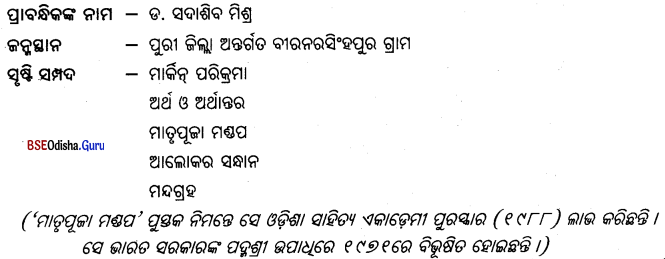
ସ୍ଵାଧୀନତୋତ୍ତର ଓଡ଼ିଆ ପ୍ରବନ୍ଧର କ୍ରମବିକାଶରେ ପଦ୍ମଶ୍ରୀ ଡ. ସଦାଶିବ ମିଶ୍ର ଜଣେ ପ୍ରବୀଣ ଶିକ୍ଷାବିତ୍, ଗଠନାତ୍ମକ ବୁଦ୍ଧିଜୀବୀ, ସ୍ଵାଧୀନଚେତା, ଐତିହ୍ୟବାଦୀ ତଥା ନୀତିନିଷ୍ଠ ପ୍ରାବନ୍ଧିକ ଭାବେ ସୁପରିଚିତ । ପ୍ରଜ୍ଞା, ବିଚାର, ଦର୍ଶନ, ମନନ, ଐତିହ୍ୟ ତଥା ମୂଲ୍ୟବୋଧକୁ ଆଧାର କରି ତାଙ୍କ ପ୍ରବନ୍ଧ ଜଗତ ପରିକଳ୍ପିତ । କ୍ଷୁଦ୍ରବାକ୍ୟ, ରମ୍ୟବୋଧକ ଶବ୍ଦଶୈଳୀ, ସାବଲୀଳ ଭାଷା, ପ୍ରଭାବଶାଳୀ ବିଚାର ତଥା ଦୃଷ୍ଟାନ୍ତମୂଳକ ରଚନାଭଙ୍ଗୀ ତାଙ୍କ ପ୍ରବନ୍ଧକଳାର ବିଶେଷତ୍ଵ । ଅର୍ଥନୀତି, ସାମାଜିକ ସମସ୍ୟା, ଐତିହ୍ୟବାଦୀ ସଂସ୍କାର ତାଙ୍କ ପ୍ରବନ୍ଧର ବିଷୟଗତ ବୈଶିଷ୍ଟ୍ୟ । ବକ୍ତବ୍ୟଧର୍ମିତା ତଥା ଅଭିମତ ପ୍ରଦାନର ମାର୍ମିକ ଆବେଦନ ଦେଇ ତାଙ୍କ ପ୍ରବନ୍ଧରାଜି ଲାଭ କରିଛି ସ୍ୱତନ୍ତ୍ର ପାଠକୀୟ ସଂପ୍ରୀତି ।

ପ୍ରାବନ୍ଧିକଙ୍କ ଆଭିମୁଖ୍ୟ :
କୌଣସି ବିଚାରଧାରା ବା ଯୋଜନା ସମୂହକୁ ଦୃଷ୍ଟିରେ ରଖ୍ କାର୍ଯ୍ୟକାରୀ କରାଗଲେ ତା’ର ସୁଫଳ ସମଗ୍ର ସମାଜ ଲାଭ କରିବାକୁ ସମର୍ଥ ହେବ– ଏହାହିଁ ପ୍ରାବନ୍ଧିକଙ୍କ ‘ସମୂହ ଦୃଷ୍ଟି’ ପ୍ରବନ୍ଧର ଅନ୍ତଃସ୍ବର ।
ପ୍ରବନ୍ଧର ସାରମର୍ମ :
ମିଥ୍ୟାର ପ୍ରଜାବତ୍ସଳ ନରପତି ଜନକ ତୋଳିଯାଇଛନ୍ତି ପ୍ରାଚୀନ ସଂସ୍କୃତିର ଏକ ଆଦର୍ଶ ସୌଧ । ସତୀସ୍ଵାଧୀ ସୀତାଙ୍କର ଜନକଭାବରେ ଏକ ମହାନ୍ ପରାକାଷ୍ଠା ସୃଷ୍ଟି କରିବା ସହିତ ଛାଡ଼ିଯାଇଛନ୍ତି ମହନୀୟ ସାଧନାର ଏକ ଚୂଡ଼ାନ୍ତ ନିଦର୍ଶନ । ଏ ପୁଣ୍ୟଭୂମି ଭାରତବର୍ଷରେ ମୁନିଋଷିମାନେ ସାଧନାଦ୍ୱାରା, ତପସ୍ୟା ବଳରେ ଅସାଧ୍ୟ ସାଧନ କରିବା ସହ ଏ ଦେଶରେ ସୃଷ୍ଟି କରିଥିଲେ ପବିତ୍ର ଆଧ୍ୟାତ୍ମିକ ସଂସ୍କୃତି । କିନ୍ତୁ ସେମାନଙ୍କ ମଧ୍ୟରେ ଜାତିଭେଦ ନଥିଲେ ମଧ୍ୟ ଥିଲା ସ୍ତରଭେଦ; ଯଥା— ମହର୍ଷି, ଦେବର୍ଷି, ବ୍ରହ୍ମର୍ଷି ଓ ରାଜର୍ଷି । ନାରଦ ଥିଲେ ଦେବର୍ଷି, ଜନକ ଥିଲେ ରାଜର୍ଷି, ବିଶ୍ଵାମିତ୍ର ଥିଲେ ମହର୍ଷି ଓ ବଶିଷ୍ଠ ଥିଲେ ବ୍ରହ୍ମର୍ଷି । ବିଶ୍ୱାମିତ୍ର ବ୍ରହ୍ମର୍ଷିରୂପେ ସ୍ବୀକୃତି ଲାଭ କରିବାପାଇଁ ବଶିଷ୍ଠଙ୍କର ସମସ୍ତ ପୁତ୍ରଙ୍କୁ ହତ୍ୟା କରିଥିଲେ ।
ଦିନେ ରାଜର୍ଷି ଜନକ ପ୍ରାସାଦ ସମ୍ମୁଖରେ ଜଣେ ଋଷିଙ୍କୁ ଦେଖ୍ ଅଭ୍ୟର୍ଥନାପୂର୍ବକ ସୁସଜ୍ଜିତ ସମ୍ବର୍ଦ୍ଧନା ପାଇଁ ସକଳପ୍ରକାର ବନ୍ଦୋବସ୍ତଯୁକ୍ତ ଅତିଥ୍-କକ୍ଷକୁ ନେଇଗଲେ । ସେଠାରେ କୌଣସି ଆଳାପ ହେବା ପୂର୍ବରୁ ଅତିଥ୍ କହିଲେ, ‘କ୍ଷମା କରିବେ ମହାରାଜ ଜନକ ! ଆପଣ ଜଣେ ଭଣ୍ଡ ତପସ୍ବୀ, ଶଠତାରେ ସମସ୍ତଙ୍କୁ ବଶ କରିପାରିଛନ୍ତି, ପ୍ରବଞ୍ଚନାରେ ଦିଗ୍ବିଜୟ କରିଛନ୍ତି । ଆପଣ ବିରାଟ ରାଜ୍ୟର ଅଧୀଶ୍ଵର; ବିସ୍ତର କ୍ଷମତାର ଅଧୂପତି । ପଦତଳେ ଆପଣଙ୍କର ବିପୁଳ ବିଭବ । ଏଭଳି ଅଖଣ୍ଡ ସମୃଦ୍ଧିର ଅଧିକାରୀ ହୋଇ, ବିଳାସ-ବ୍ୟସନରେ ବୁଡ଼ିରହି ତପସ୍ବୀରୂପେ ପ୍ରତିଷ୍ଠା ଅର୍ଜନ କରିବା କି ଅସାଧାରଣ ପ୍ରତାରଣା ! ରାଜା ହୋଇ ପୁଣି ଋଷି !”’
କିନ୍ତୁ ରାଜର୍ଷି ଜନକ ଋଷିସୁଲଭ ଗୁଣରେ ଧୀରସ୍ଥିର ଭାବରେ ଉତ୍ତର ଦେଲେ– ‘ଋଷି ପ୍ରବର ! ଆପଣ ମୋର ବରେଣ୍ୟ ଅତିଥି । ଅତିଥ୍ୟସେବା ମୋର ଧର୍ମ । ସେ ଧର୍ମରୁ ମୋତେ ବଞ୍ଚତ କରନ୍ତୁ ନାହିଁ । ସ୍ନାନକୃତ୍ୟ ସମାପନ କରନ୍ତୁ । କିଛି ଭୋଜନ କରି ବିଶ୍ରାମ କରନ୍ତୁ । ତା’ପରେ ବସି ସବୁ ବିଷୟ ଆଲୋଚନା କରିବା ।’’ ଅତିଥୁ ଋଷି ପ୍ରବର ତଥା ରାଜର୍ଷି ଜନକଙ୍କର ଏହି ଉକ୍ତି ପ୍ରତ୍ୟୁକ୍ତି ମାଧ୍ୟମରେ ପ୍ରାବନ୍ଧିକ ଋଷିମାନଙ୍କ ମଧ୍ୟରେ ଥିବା ସ୍ତରଭେଦର ରହସ୍ୟକୁ ସୁନ୍ଦରଭାବେ ପ୍ରତିପାଦନ କରିଛନ୍ତି । ସହସା ଅତିଥ୍ ଋଷିବରଙ୍କ ଭର୍ସନାବାଣୀ ଶୁଣି ମଧ୍ୟ ରାଜର୍ଷି ଜନକ ନମ୍ରତାପୂର୍ବକ ଧୀରସ୍ଥିର ଭାବରେ ଅତିଥ୍ୟସେବାରୂପକ ପବିତ୍ର ଧର୍ମପାଳନ ନିମନ୍ତେ ସୁଯୋଗ ଦେବାପାଇଁ ନିବେଦନ କରିଛନ୍ତି ।
ତତ୍ପରେ ଅତିଥ୍ୟ ପ୍ରବର ରାଜକୀୟ ସମାରୋହରେ ନିତ୍ୟକର୍ମ ସମାପନ କରି ଜନକଙ୍କ ସହ ପରସ୍ପର ସମ୍ମୁଖୀନ ହୋଇ ବସି ମୂହୁ ସମ୍ଭାଷଣ ମଧ୍ୟରେ ମଧ୍ୟାହ୍ନ ଭୋଜନ ଗ୍ରହଣ କଲେ । ଏହାପରେ ଜନକ ଅତିଥ୍ୟ ପ୍ରବରଙ୍କୁ ଖାଦ୍ୟପେୟ ସମ୍ପର୍କରେ ପଚାରନ୍ତେ ସେ ଚର୍ଯ୍ୟ, ଚୋଷ୍ୟ, ଲେହ୍ୟ, ପେୟ ସମସ୍ତ ଖାଦ୍ୟପେୟ ରୁଚିକର, ତୃପ୍ତିକର ତଥା ଉପଭୋଗ୍ୟ ହୋଇଥିଲେ ମଧ୍ୟ ଉପଭୋଗ କରିପାରିଲେ ନାହିଁ ବୋଲି ପ୍ରକାଶ କରିଥିଲେ । କାରଣ ଭୋଜନ ସ୍ଥାନରେ ତାଙ୍କର ଠିକ୍ ମୁଣ୍ଡ ଉପରେ ଝୁଲୁଥିବା ଖଡ୍ଗ ଦେଖ୍ ସେ ଖାଦ୍ୟ ଉପଭୋଗ କରିବା ପରିବର୍ତ୍ତେ ଗିଳିପକାଇଥିଲେ । ତେଣୁ ସେ ଭୋଜନ ସ୍ଥାନରେ ଖଡ୍ଗ ଝୁଲିବାର କାରଣ ରାଜର୍ଷି ଜନକଙ୍କୁ ପଚାରିଥିଲେ ।
ଉତ୍ତର ଦେଲେ ରାଜର୍ଷି ଜନକ । ସେହି ଖଡ୍ଗ ତାଙ୍କୁ ସଂଯତ କରିବା ସହ ଉପଭୋଗରେ କରିଛି ନିର୍ଲିପ୍ତ । ମିଥୁଳା ରାଜ୍ୟ ଭସ୍ମୀଭୂତ ହୋଇଗଲେ ବି ତାଙ୍କର ବ୍ୟକ୍ତିଗତ ଭାବରେ ଲାଭ ବା କ୍ଷତି ହେବ ନାହିଁ । ଉପଭୋଗ ତାଙ୍କର ରାଜକୀୟ ମର୍ଯ୍ୟାଦା, ଶାସନ ଓ ଶୃଙ୍ଖଳା ରାଜକୀୟ କର୍ଭବ୍ୟ ଏବଂ ସମାଜ କଲ୍ୟାଣ ହେଉଛି ରାଜକୀୟ ଧର୍ମ । ସେହି ଖଡ୍ଗ ଅନାସକ୍ତି ଯୋଗରେ କରିଛି ଦୀକ୍ଷିତ ।
ଶ୍ରୀମଦ୍ ଭଗବତ୍ତାର କର୍ମଯୋଗ ଅଧ୍ୟାୟରେ ଲେଖାଅଛି –
‘କର୍ମଶୈବ ହି ସିଂସିଦ୍ଧିମାସ୍ଥିତା ଜନକାଦୟଃ ।’
ଜନକାଦି ମହାପୁରୁଷମାନେ କର୍ମରେ ହିଁ ସିଦ୍ଧିଲାଭ କରିଛନ୍ତି । ସେ କର୍ମରେ ଥିଲା କର୍ତ୍ତବ୍ୟବୋଧ, ନଥିଲା ଧନ ଦିଅ, ଯଶ ଦିଅ, ଜନ ଦିଅର ଆଉଁ ଚିତ୍କାର, ଥିଲା ଜନମଙ୍ଗଳ, ସମାଜ କଲ୍ୟାଣ ଏବଂ ବ୍ୟକ୍ତିଗତ ଅନାସକ୍ତି । କିନ୍ତୁ ନିଷ୍କାମ କର୍ମ ସମ୍ପୂର୍ଣ୍ଣ ଅସମ୍ଭବ । ଫଳପ୍ରାପ୍ତିର ଆକାଂକ୍ଷା ନଥୁଲେ କର୍ମ ନିମନ୍ତେ ପ୍ରବୃତ୍ତି ଆସିବ ନାହିଁ । ପାରିତୋଷିକ ନଥିଲେ ପ୍ରେରଣା ଜାଗ୍ରତ ହେବ ନାହିଁ । ଲାଭ ନଥାଇ କେହି ବଣିଜ କରିବ ନାହିଁ । ଏହି ବିଚାର ପ୍ରାଚୀନ କାଳରେ ରାମାୟଣ ତଥା ମହାଭାରତ ଯୁଗରେ ମଧ୍ୟ ଥିଲା । ସାଧନା ଓ ତପସ୍ୟାର ମୁଖ୍ୟ ଉଦ୍ଦେଶ୍ୟ ଥିଲା କାମନାସିଦ୍ଧି । ଧନସମ୍ପଦ, ମାନମର୍ଯ୍ୟାଦା, ଶକ୍ତିକ୍ଷମତା— ହେଉଛି ପ୍ରେରଣାର ଉତ୍ସ । କିନ୍ତୁ ତନ୍ମଧ୍ୟରେ ସମାଜ ପ୍ରତି ଦାୟିତ୍ୱବୋଧ ଥିଲା ସନ୍ନିହିତ ।
ଗତ ଦୁଇଶହ ବର୍ଷ ମଧ୍ୟରେ ଶିଳ୍ପ ଓ ବାଣିଜ୍ୟ କ୍ଷେତ୍ରରେ ଯେଉଁ ଅଭିନବ ଅଗ୍ରଗତି ହେଲା, ପ୍ରଣାଳୀ ଓ ପ୍ରବିଧିରେ ଉତ୍ତରୋତ୍ତର ପରିବର୍ତ୍ତନ ଘଟିଲା, ତା’ର ଫଳସ୍ବରୂପ ଧନ, ସମ୍ପଦ, କ୍ଷମତା ଅଳ୍ପ କେତେକଙ୍କ ହାତରେ କେନ୍ଦ୍ରୀଭୂତ ହୋଇଗଲା । ଫଳରେ ସମାଜର ଅକଲ୍ୟାଣ ହେବା ସହିତ ଉପୀଡ଼ନ ପଡ଼ିଲା ଲୋକଙ୍କ ଉପରେ । ସୃଷ୍ଟି ହେଲା ଅଶାନ୍ତ, ସଂଘର୍ଷ ଓ ଗୋଷ୍ଠୀଗତ ହିଂସାକାଣ୍ଡ ।
ଏହି ପରିବେଶ ମଧ୍ୟରେ ମହାତ୍ମା ଗାନ୍ଧି ଉପସ୍ଥାପନ କଲେ କର୍ମଯୋଗର ଏକ ରୂପାନ୍ତର । ଯେଉଁ କର୍ମର ସକଳ ମୂଳଭିତ୍ତି ଥିଲା ସତ୍ୟ ଓ ଅହିଂସା । ଆନ୍ଦୋଳନ, ଅଭିଯାନ, ରାଜନୀତି ଏବଂ ଅର୍ଥନୀତି ପ୍ରତିଟି କ୍ଷେତ୍ରରେ ସେହି ଦୁଇଟି ତତ୍ତ୍ବ ଥିଲା ପ୍ରମୁଖ ଆୟୁଧ । ଗୀତା, ବାଇବେଲ, ରୁଷିଆର ଟଲଷ୍ଟୟ, ଇଂଲଣ୍ଡର ରସ୍କିନ୍ ଏବଂ ଫ୍ରାନ୍ସର ଥୋରିଓଙ୍କ ଲେଖାରେ ସେ ପାଇଥିଲେ ଜୀବନ ଦର୍ଶନ । ସେହି ଦର୍ଶନ ଉପରେ ଆଧାରିତ ଥିଲା ତାଙ୍କର ଟ୍ରଷ୍ଟିସିପ୍ ବା ନ୍ୟାସୀତ୍ଵ ନୀତି ।
ଭାରତବର୍ଷର ସମାଜ, ବ୍ୟକ୍ତି ତଥା ବିଭିନ୍ନ ଗୋଷ୍ଠୀ ମଧ୍ୟରେ ଆୟ ଏବଂ ସମ୍ପଦର ଉତ୍କଟ ତାରତମ୍ୟ କ୍ରମଶ ବୃଦ୍ଧି ପାଇବାରେ ଲାଗିବାରୁ ସମାଜର ସ୍ଥିତି ସମ୍ପର୍କରେ ଚିନ୍ତାକରି ମହାତ୍ମା ଗାନ୍ଧି ୧୯୪୦ ମସିହା ଅଗଷ୍ଟ ମାସର ‘ହରିଜନ’ପତ୍ରିକାରେ ନ୍ୟାସୀତତ୍ତ୍ଵର ବ୍ୟାଖ୍ୟା କରିଥିଲେ । ଶିଳ୍ପପତି, ଧନୀ ତଥା ବ୍ୟବସାୟୀମାନେ ସେମାନଙ୍କ ଶିଳ୍ପ, ସମ୍ପତ୍ତି ତଥା ବ୍ୟବସାୟର ମାଲିକ ହୋଇ ରହିବେ । ସେଥୁରୁ ସେମାନଙ୍କୁ ବିଚ୍ୟୁତ କରାଯିବ ନାହିଁ । ପରିଚାଳନାର ସାଫଲ୍ୟ ହେବ ସେମାନଙ୍କ ଗୌରବ । କିନ୍ତୁ ତାଙ୍କ ନିଜ ପାଇଁ ତଥା ପରିବାରବର୍ଗଙ୍କ ପାଇଁ ଯଥାର୍ଥରେ ଯେତିକି ଆବଶ୍ୟକ ସେତିକି ଅର୍ଥ ବ୍ୟୟ କରିବେ ଏବଂ ଉଦ୍ବୃତ୍ତ ଲାଭାଂଶ ସମାଜର ହିତକାର୍ଯ୍ୟରେ ସ୍ଵେଚ୍ଛାରେ ବ୍ୟୟ କରିବେ, ବାଧ୍ୟବାଧକତାରେ ନୁହେଁ । ସେଥିପାଇଁ ସେମାନେ ହେବେ ସମାଜର ନ୍ୟାସୀ । ଗାନ୍ଧିଜୀଙ୍କ ଅହିଂସା ନୀତି ଅନୁଯାୟୀ ସେମାନଙ୍କୁ ସମ୍ପତ୍ତିରୁ ବଳପୂର୍ବକ ବିଚ୍ୟୁତ କରିବା ଅସଙ୍ଗତ । ତେଣୁ ସେମାନେ ସ୍ୱତଃପ୍ରବୃତ୍ତ ହୋଇ ନ୍ୟାସୀତ୍ଵ ବରଣ କରିବେ ।
ବଳପୂର୍ବକ ସମ୍ପତ୍ତି ବାଜ୍ୟାପ୍ତି କଲେ, ତାହା ହୁଏ ହିଂସାପ୍ରଣୋଦିତ ଆଚରଣ । ତନ୍ମଧ୍ୟରୁ ଜାତ ହୁଏ ପ୍ରତିହିଂସା । ସେପରି ପନ୍ଥା ଅବଲମ୍ବନରେ ପ୍ରସଙ୍ଗକ୍ରମେ ପ୍ରକୃତି ହୁଏ ରଞ୍ଜିତ, ସମାଜର ସ୍ଥିତି ହୁଏ ଅଶାନ୍ତ । ତେଣୁ ଗାନ୍ଧିଜୀ ଅନାସକ୍ତିର ରୂପାନ୍ତର କରି ପ୍ରଣୟନ କଲେ ନ୍ୟାସୀବାଦ । ସାମାଜିକ ଅନ୍ୟାୟ ବିରୋଧରେ ସଂଗ୍ରାମ କରୁଥିବା ସୋସାଲିଷ୍ଟମାନେ ବ୍ୟକ୍ତିଗତ ସମ୍ପତ୍ତିର ବିରୋଧୀ । ସମାଜରୁ ଉତ୍କଟ ଅସାମ୍ୟର ଉଚ୍ଛେଦ ଲାଗି ସେମାନେ ବଦ୍ଧପରିକର । ସେହି ମର୍ମରେ ଗାନ୍ଧିଜୀ ମଧ୍ଯ ନୀତିବଦ୍ଧ ସୋସାଲିଷ୍ଟ । କିନ୍ତୁ ତାଙ୍କ ସୋସାଲିଜିମ୍କୁ ୟୁଟୋପିଆ ବା ଅବାସ୍ତବ କଳ୍ପନା ବୋଲି କୁହାଯିବ । କାରଣ ସମାଜରେ ସମସ୍ତ ରାଜା, ଜମିଦାର, ଶିଳ୍ପପତି, ବ୍ୟବସାୟୀ ପ୍ରଭୃତି ସକଳ ଶ୍ରେଣୀର ଲୋକଙ୍କ ହୃଦୟରେ ଅନାସକ୍ତ ସାମାଜିକ ଦାୟିତ୍ଵ ପ୍ରକଟିତ ହେବା ଅସମ୍ଭବ ।
ପାରି ଲେଖୁଲେ ‘ଜନକାଦୟଃ’ । ସୁତରାଂ ସେ ଯୁଗରେ ନୁହେଁ, କୌଣସି ଯୁଗରେ ବିତ୍ତଶାଳୀ ଲୋକଙ୍କୁ ସନ୍ନ୍ୟାସୀତ୍ଵରେ ଦୀକ୍ଷିତ କରିବା ଅବାସ୍ତବ ପରିକଳ୍ପନା । କାରଣ ଏହା ଆଦର୍ଶର ମହତ୍ତ୍ବରେ ଉଦ୍ଭାସିତ । ଅବାସ୍ତବ ହେଲେ ମଧ୍ୟ ଏଥିରେ ଅଛି ଆଦର୍ଶର ପ୍ରଭାବ ଓ ନିହିତ ଅଛି ସମୂହ ନୀତି । ନ୍ୟାସୀତ୍ଵ ଗାନ୍ଧି ଅର୍ଥନୀତିର ଏକ ବିଶିଷ୍ଟ ଅଙ୍ଗ । ସ୍ଵାଧୀନତା ସଂଗ୍ରାମରେ ଲିପ୍ତ ଥିବାବେଳେ ଗାନ୍ଧି ୧୯୪୦ ମସିହାରେ ସମାଜର ମଙ୍ଗଳ ପାଇଁ ପ୍ରଣୟନ କରିଥିଲେ ନ୍ୟାସୀବାଦ । ସ୍ଵାଧୀନତା ପ୍ରାପ୍ତି ପରେ ୧୯୫୧ ମସିହାରେ ଆରମ୍ଭ ହେଲା ଅର୍ଥନୈତିକ ଯୋଜନା । କିନ୍ତୁ ସେଥିରେ ଗାନ୍ଧିନୀତି ସ୍ଥାନ ପାଇଲା ନାହିଁ ।
ପ୍ରତି ପାଞ୍ଚବର୍ଷୀୟ ଯୋଜନାର ଅଭୀଷ୍ଟ ଥିଲା ଧନୀ ଦରିଦ୍ର ମଧ୍ୟରେ ଥିବା ବ୍ୟବଧାନ ହ୍ରାସ । ଦେଶର ଆୟ ଓ ସମ୍ପଦ ମୁଷ୍ଟିମେୟ ଲୋକଙ୍କ ହାତରେ କେନ୍ଦ୍ରୀଭୂତ ନ ହେବା । ପ୍ରତି ଯୋଜନାରେ ଏହି ଅଭୀଷ୍ଟ ବୟାନ କରାଯାଉଥିଲେ ମଧ୍ୟ ଧନୀ ଦରିଦ୍ର ମଧ୍ୟରେ ବ୍ୟବଧାନ ବୃଦ୍ଧିପାଇବା ସହ ସମୃଦ୍ଧ ଲୋକଙ୍କ ହାତରେ ସମ୍ପଦ ବେଶିମାତ୍ରାରେ କେନ୍ଦ୍ରୀଭୂତ ହୋଇଛି ବୋଲି ସମୀକ୍ଷା ପ୍ରକାଶ ପାଇବା ସହ ଏହି ପ୍ରକ୍ରିୟା ଅବିରତ ଲାଗିରହିଛି ବୋଲି ଷଷ୍ଠ ଯୋଜନା ରିପୋର୍ଟରେ କୁହାଯାଇଛି ।

ପୂର୍ବବର୍ତ୍ତୀ ଯୋଜନାଗୁଡ଼ିକରେ ବିପୁଳ ଅର୍ଥ ବିନିଯୋଗ କରାଯାଇଛି । ସହାୟତା ମିଳିବା ସହ ବିଦେଶରୁ ସମ୍ବଳ ଆସିଛି । ପ୍ରବିଧ୍ ମଧ୍ୟ ଆହରଣ କରାଯାଇଛି; କିନ୍ତୁ ଉତ୍ପାଦନ ଯେତିକି ମାତ୍ରାରେ ବୃଦ୍ଧିପାଇବ ବୋଲି ଲକ୍ଷ୍ୟ ଧାର୍ଯ୍ୟ ହୋଇଥିଲା, ହୋଇପାରିଲା ନାହିଁ । ତଥାପି ସାଢ଼େ ତିନି ହାରରେ ଉତ୍ପାଦନ ବୃଦ୍ଧି ପାଇଛି । ଯୋଜନା ଆରମ୍ଭରେ ଖାଦ୍ୟଶସ୍ୟ ଉତ୍ପାଦନ ହୋଇଥିଲା ୫୦ ନିୟୁତ ଟନ୍ । ୧୯୭୮ରେ ଉତ୍ପାଦନ ହୋଇଛି ୧୧୫ ନିୟୁତ ଟନ୍ । ବିଜ୍ଞାପନର ପ୍ରବର୍ତ୍ତନ ବିସ୍ତାରଲାଭ କରିଛି । ସଞ୍ଚାର ମାର୍ଗ ଓ ପରିବହନ ବିଶେଷ ପ୍ରସାରଲାଭ କରିବା ସହ ଭାରତବର୍ଷ ଆଧୁନିକ ମହଲରେ ପ୍ରବେଶ କରିଛି ।
କିନ୍ତୁ ସମାଜର କଲ୍ୟାଣ ପାଇଁ ସମୂହର ବିକାଶ ପାଇଁ ଯୋଜନାରେ ଯେଉଁ ଅଭୀଷ୍ଟ ନିର୍ଦ୍ଦେଶିତ ହୋଇଥିଲା, ତାହା ସାଧୁ ହୋଇପାରି ନାହିଁ । ଲକ୍ଷ୍ୟ ଥିଲା, ଅକର୍ମା ସମସ୍ୟାର ସମାଧାନ ହେବ, ମାତ୍ର ବେକାରି ବୃଦ୍ଧି ପାଇବାରେ ଲାଗିଛି । ଦାରିଦ୍ର୍ୟ ଦୂର ହେବା ପରିବର୍ତ୍ତେ ବଢ଼ିଚାଲିଛି । ଲୋକଙ୍କର ସର୍ବନିମ୍ନ ଆବଶ୍ୟକତା ପୂରଣ ହେବା ପରିବର୍ତ୍ତେ ଅପୂର୍ଣ ପଡ଼ିରହିଛି । ମୁଣ୍ଡ ଗୁଞ୍ଜିବାକୁ ଘର ଖଣ୍ଡେ କିମ୍ବା ପିଇବାକୁ ପାଣି ମୁନ୍ଦିଏ ମିଳିଲା ନାହିଁ । ଶାସନ ବିକେନ୍ଦ୍ରୀକରଣ କରାଯିବା ବଦଳରେ ଶାସନ ଅଧ୍ଵ କେନ୍ଦ୍ରୀଭୂତ ହେଲା । ସମ୍ବଳର ଅଭାବ ନଥିଲା । ପ୍ରକଳ୍ପ ପ୍ରସ୍ତୁତ ହେଲା, ପରିବ୍ୟୟ ଧାର୍ଯ୍ୟ କରାଗଲା, ପ୍ରଭୂତ ଅର୍ଥ ବିନିଯୋଗ ହେଲା; ମାତ୍ର ଅଭୀଷ୍ଟ ସାଧୂ ହୋଇପାରିଲା ନାହିଁ ।
ଏହାର ଏକାନ୍ତ ଅଭାବ ହେଲା ଆଗ୍ରହ, ଆଭିମୁଖ୍ୟ ଏବଂ ଆନ୍ତରିକତା । ଗାନ୍ଧିଜୀ ତାଙ୍କ କର୍ମଯୋଗର ରୂପାନ୍ତର ନ୍ୟାସୀବାଦରେ ଦେଇଥିଲେ ଏକ ସମୂହ ଦୃଷ୍ଟି । ଦେଇଥିଲେ ରାଜର୍ଷି ଜନକଙ୍କର ତୀକ୍ଷ୍ଣଣ ଖଡ଼ଗର ସୂଚନା । କିନ୍ତୁ ସେହି ସମୂହ ଦୃଷ୍ଟିକୁ ଶୀତଳ ଭଣ୍ଡାରରେ ନିକ୍ଷେପ କରାଗଲା । ପ୍ରଖ୍ୟାତ ଅର୍ଥନୀତିଜ୍ଞ ଗୁନାର ମିରଡ଼ାଲ୍ ତାଙ୍କ ନୋବେଲ ପୁରସ୍କାର ପ୍ରାପ୍ତ ‘ଏସିଆନ୍ ଡ୍ରାମା’ ସନ୍ଦର୍ଭରେ ‘ନରମା ରାଷ୍ଟ୍ର’ ବିଷୟରେ ଆଲୋଚନା କରିଛନ୍ତି । ତାଙ୍କ ମତରେ ଭାରତ ପରି ମନ୍ଦ ବିକଶିତ ଦେଶରେ ନରମା ରାଷ୍ଟ୍ର ଥିବାରୁ ବିକାଶ ପ୍ରତିହତ ହେଉଅଛି । ଦେଶର ଯୋଜନାରେ ଅଛି ମନ୍ଦହାସର ଆକର୍ଷଣ, ନାହିଁ ସ୍ନିଗ୍ଧହାସର ଅନୁରାଗ ।
ସାମାଜିକ ଶୃଙ୍ଖଳାର ଅଭାବ ହିଁ ନରମ ରାଷ୍ଟ୍ରର ବିଶେଷ ଲକ୍ଷଣ । କୌଣସି ବ୍ୟବସ୍ଥା ବା ନିର୍ଦ୍ଦେଶ ପ୍ରଣୟନ କରାଗଲେ ଉଚ୍ଚ-ନୀଚ, ଶିକ୍ଷିତ-ଅଶିକ୍ଷିତ ସକଳ ସ୍ତରରେ ତାକୁ ଅମାନ୍ୟ କରିବା ହେଉଛି ସେମାନଙ୍କ ସ୍ବଭାବ । କର୍ମରେ ଅବହେଳା, ବିଭିନ୍ନ ବିଭାଗରେ ଆଦେଶର ପ୍ରତିରୋଧ ହୋଇଛି ଏକ ସାଧାରଣ ପ୍ରବୃତ୍ତି । ସାମାଜିକ ପ୍ରତିଷ୍ଠା ତଥା ରାଜନୈତିକ କ୍ଷମତା ଥିବା ବ୍ୟକ୍ତି ଅବାଧରେ କରିଚାଲିଛି ସ୍ୱାର୍ଥସିଦ୍ଧି । ଏପରି ନରମା ରାଷ୍ଟ୍ରରେ ଅର୍ଥନୈତିକ ବିକାଶ ପ୍ରତିହତ ହେବା ସ୍ଵାଭାବିକ କାରଣ ଅଗ୍ରଗତି ପାଇଁ ପରିବେଶ ଅତ୍ୟନ୍ତ ପ୍ରତିକୂଳ ।
ସ୍ଵାଧୀନତା ସଂଗ୍ରାମ କାଳରେ ସଂଗ୍ରାମୀମାନଙ୍କ ମଧ୍ୟରେ ଥିଲା ସମୂହ ଦୃଷ୍ଟି; କିନ୍ତୁ ଭାରତବର୍ଷକୁ କ୍ଷମତା ହସ୍ତାନ୍ତରିତ ହେବାର ପୂର୍ବାଭାସରୁ ଗାନ୍ଧିଜୀ ନେତୃମହଲରେ ଲକ୍ଷ୍ୟ କଲେ ସମୂହ ଦୃଷ୍ଟି ପରିବର୍ତ୍ତେ ସ୍ଵାର୍ଥଦୃଷ୍ଟିର ପ୍ରଭାବ । ତେଣୁ ମର୍ମାହତ ଗାନ୍ଧିଜୀ ୧୯୪୭ ଅଗଷ୍ଟ ୧୫ ମଧ୍ୟରାତ୍ରରେ ଆମେ ସ୍ଵାଧୀନତାର ମହୋତ୍ସବରେ ବିଭୋର ହୋଇଥିବାବେଳେ ଏକ ସୁଦୂର ପଲ୍ଲୀରେ ଅତିବାହିତ କରିଥିଲେ ବିଷଣ୍ଣ ରଜନୀ । ଜାତିର ଜନକଙ୍କୁ ପ୍ରତ୍ୟାଖ୍ୟାନ କରି ଆମେ ଗାଇଲୁ ସ୍ୱାଧୀନତାର ଆବାହନୀ । କିନ୍ତୁ ଛଅମାସ ପରେ ଆତତାୟୀର ଗୁଳି ଗାନ୍ଧିଜୀଙ୍କ ଜୀବନଦୀପକୁ ନିର୍ବାପିତ କରିଦେଲା ।
ଗାନ୍ଧିଜୀ ଗଢ଼ିବାକୁ ଚାହୁଁଥିଲେ ଏକ ସୁସ୍ଥ ସମାଜ, ଏକ ସମୂହ ପରିବାର । ଯେଉଁଠାରେ ନଥୁବ ଶୋଷଣ, ଅନାଚାର, ଥବ ବିଚାର ଓ ସମନ୍ୱୟ । ସେ କରିଥିଲେ ଏକ ପୂର୍ଣାଙ୍ଗ ମାନବର ପରିକଳ୍ପନା, ଯେଉଁଠାରେ ସମନ୍ବିତ ହୋଇଥିଲା ନୈତିକତା, ଅର୍ଥନୀତି, ରାଜନୀତି ଓ ସମାଜ ଦୃଷ୍ଟି । ତାଙ୍କର ସକଳ ଚିନ୍ତା, କଳ୍ପନା, ଭାଷଣ ଓ ରଚନା ଥିଲା ଗୋଟିଏ ସୃଷ୍ଟିର ସମାହାର । ପରିକଳ୍ପନାର ମୂଳମନ୍ତ୍ର ଥିଲା ସମୂହ ଦୃଷ୍ଟି, ସମାଜ ପାଇଁ ଆମ୍ବୋତ୍ସର୍ଗ ।
କିନ୍ତୁ ଗାନ୍ଧିଜୀଙ୍କ ଦାୟାଦମାନେ ତାଙ୍କ ବଚନକୁ ପ୍ରବଚନରୂପେ ପ୍ରଚାର କରିବା ସହିତ ତାଙ୍କ ଲେଖାକୁ ଉଦ୍ଧାର କରି ବିବୃତିରେ ପରିଣତ କରୁଛନ୍ତି । ସମାଜ ଦୃଷ୍ଟି ସ୍ଥାନରେ ଆଜି ତେଜି ଉଠୁଛି ସଂଘର୍ଷ, ଉତ୍କଟ ଆତ୍ମସେବା, ଉଭେଇ ଯାଇଛି ତାଙ୍କ ନ୍ୟାସୀତତ୍ତ୍ଵ । ତାଙ୍କ ବିଚାରକୁ ପରିହାସ କରି, ତାଙ୍କ ରଚନାରୁ ସାମୟିକ ଉଦ୍ଧାର କରି ସ୍ବାର୍ଥସିଦ୍ଧି କରିବାର ପ୍ରଚେଷ୍ଟା କରାଯାଉଛି । ସେହି ପ୍ରଚେଷ୍ଟାରୁ ସୃଷ୍ଟି ହୋଇଛି ସାମାଜିକ ସଙ୍କଟ । ଆଦର୍ଶକୁ ନିର୍ମୂଳ କଲେ, ଆକ୍ରମଣ କରେ ପ୍ରତାରଣା । ସେହି ପ୍ରତାରଣାରୁ ଉଭୂତ ହୁଏ ଅବାଞ୍ଛନୀୟ ପ୍ରତିକ୍ରିୟା । ଏହି ଚେତାବନୀ ଇତିହାସ ଆମକୁ ବାରମ୍ବାର ଦେଇଆସିଛି ।
ବିଷୟଗତ ଶବ୍ଦ ଓ ଅର୍ଥ
- ନରପତି – ରାଜା ।
- ଜନକ – ପିତା।
- ଦୁର୍ବ।ର – ଦୁର୍ଦ୍ଦମନୀୟ । ଯାହାକୁ ବାଧାଦେବା ବା ନିବାରଣ କରିବା ସହଜ ନୁହେଁ ।
- ପ୍ର।ସାଦ – ଅ ଳିକା/କୋଠ।
- ଉପନୀତ – ପ୍ରବେଶ ।
- ଅଭ୍ୟ।ଗତ – ଆଗନ୍ତୁକ ।
- ସଂଳାପ – ଉଭୟପକ୍ଷ କଥାବାର୍ତ୍ତା ।
- ପ୍ରବଞ୍ଚନା – ପ୍ରତାରଣା ।
- ଦିଗ୍ ବିଜୟ – ରାଜ୍ୟଜୟ ।
- ସ୍ବୀକୃତି – ଶକ୍ତି ।
- ସ୍ୱୀକୃତି – ସମ୍ମତି ।
- ସମ୍ମୁଖରେ – ଆଗରେ ।
- ସମ୍ୱଦ୍ଧନା- ସତ୍କାର, ପରିଚର୍ଯ୍ୟା ।
- କଷ- ଗୃହ ।
- ଶଠତା – ଠକାମି ।
- ଅବାକ୍ – ଆଶ୍ଚର୍ଯ୍ୟ ।
- ବିରାଟ – ବୃହତ୍ ।
- ପ୍ରତିଷା – ମର୍ଯ୍ୟ।ଦା
- ପ୍ରତି।ରଣା – ଠକାମି ।
- ବଞ୍ଚତ – ନିରାଶ ।
- ସାନକୃତ୍ୟ – ଗାଧୁଆ କାମ ।
- ପରିବେଷଶ- ପରିଷିଦେବା ।
- ଉପବେଶନ – ବସିବା ।
- ବିସ୍ତର – ପ୍ରଚୁର/ଢେର ।
- ନିଷାମ – କାମନାଶୂନ୍ୟ ।
- ଚର୍ବ୍ୟ- ଚୋବାଇ ଖାଇବା ଯୋଗ୍ୟ ।
- ପରିବ୍ୟୟ- ଅଟକଳ ।
- ଖଡ଼ଗ – ଖଣ୍ଡା ।
- ପ୍ରବିଧ୍ – ନିୟମ/ପଦ୍ଧତି ।
- କେଦ୍ରୀଭୁତ – ଠୁଳକରିବା, ଏକତ୍ର ହେବା ପ୍ରପୀଡ଼ନ ।
- ସଂଘର୍ଷ- ଯୁଦ୍ଧ ।
- ଅଭିକି୍ରୟା – ବିପରୀତ କାର୍ଯ୍ୟ ।
- ପ୍ରକରଣ – ପ୍ରସଙ୍କ
- ବୟାନ- ବର୍ଣ୍ଣନ/ବ୍ୟାଖ୍ୟାନ ।
- ଉଭାସିତ- ପ୍ରକାଶିତ ଆଲୋକିତ ।
- ପ୍ରଭୂତ- ପ୍ରଚୁର/ଅଧ୍ଵ ।
- ଦାୟାଦ – ବରଣଯୋଗ୍ୟ, ପୂଜ୍ୟ ।
- ବରେଣ୍ୟ – ଶେଷ ।
- ରାଜକୀୟ ସମାରୋହ – ରାଜକୀୟ ମର୍ଯ୍ୟାଦା ।
- ମୃଦୁ ସମ୍ଭାଷଣ – ମଧୁର ଆଳାପ ।
- ସମ୍ମୁଖୀନ – ମୁହାଁମୁହିଁ ।
- ପ୍ରବର – ପ୍ରଧାନ|ମୁଖ୍ୟ|ଶ୍ରେଷ୍ଠ |
- ପେୟ – ପାନୀୟ ।
- ଲେହ୍ୟ – ଚାଟି ଖାଇବା ଯୋଗ୍ୟ ।
- ସୂକ୍ଷ୍ମ- ସରୁ ।
- ଅନାସକ୍ତି – ଆସକ୍ତିବିହୀନ
- ପ୍ରରଣା – ଉତ୍ସାହିତ କରିବା ।
- ପ୍ରପୀଡ଼ନ – ଅତ୍ଯାଚାର ।
- ବିବୁୟତି – ରହିତ, ବଞ୍ଚତ କରିବା ।
- ସ୍ଵଚ୍ଛାରେ – ସ୍ଵଇଚ୍ଛାରେ, ନିଜ ଇଚ୍ଛାରେ ।
- ମୁଷିମେୟ – ଅଳ୍ପସଂଖ୍ୟକ ।
- ପ୍ରବର୍ତ୍ତନ – ପ୍ରଚଳନ /ଆରମ୍ଭ ।
- ଅଭୀଷ୍ମ – ବାଞ୍ଚତ
- ବିବୃତି – ବିବରଣ/ବ୍ୟାଖ୍ୟା/ବର୍ଣ୍ଣନା ।
- ସାମୟିକ – ସମୟେ ସମୟେ ।
- ପରାକାଷା – ଚରମ ସୀମା ।
- ଅଧୀଶ୍ୱର – ମହାରାଜା/ପ୍ରଭୁ ।
- ବିଭବ – ସମ୍ପଦ ।
- ନିଲିପ୍ତ – ଅନାସକ୍ତ
- ରଜନୀ – ରାତି ।
- ବାଜ୍ୟାପ୍ତି କରିବା – ସ୍ଵତ୍ଵ ଲୋପ କରିବା ।
- ଚୋଷ୍ୟ – ଶୋଷି ଖାଇବା ଯୋଗ୍ୟ ପଦାର୍ଥ ।
- ନିଷ୍ନ।ମ କର୍ମ – କାମନାହୀନ କର୍ମ ।
![]()
